Christmas 2003 edition
Perth: December 25, 2003 Price: $1

No. 3387
DISTRIBUTION
The Record, established in 1874, is distributed to Catholic Churches, presbyteries, religious houses and subscribers throughout the Archdiocese of Per th, Geraldton, Bunbury, Broome and overseas.
THE TEAM
Managing Editor
Peter Rosengren
Production/ Advertising
Carole McMillen
Office Manager Kylie Waddell JOURNALISTS
Bronwen Clune
Debbie Warrier CONTRIBUTORS
Hugh Ryan, Paul Gray, Fr Tim Deeter, Tony Evans, George Russo, Peter Dwan, Norma Woodcock, Guy Crouchback
A CHRISTMAS MESSAGE from Archbishop Barry Hickey
The real meaning of Christmas is that Almighty God joined himself to mankind in the person of Jesus Christ. This is the real meaning of Christmas and nothing else can replace it. There are many other things associated with Christmas, such as a boom in retail sales, holidays, far too many parties for anyone to keep up with, and emotionally enriching family gatherings. These other things have their uses and, in varying degrees, their value, but they are no substitute for the real meaning of Christmas.
Whatever value these other things have – and increased levels of love and kindness and generosity and goodwill have great value – they have because of the real meaning of Christmas, God’s action in joining himself (his love, his kindness, his generosity and his goodwill) to mankind through Jesus Christ.
As well as being the real meaning of Christmas, Jesus is also the real meaning of humanity.
Just as Jesus is true God and true man, so his birth means that all the goodness of God is made available to us. It is up to us whether we accept it and live with it, but our world is crying out desperately for the goodness of God, and we are the means by which the goodness of God is made manifest in the world.
Jesus came to us as a helpless baby in order to

ennoble the human experience by sharing in it. But his birth as a baby also shows us that the truth and the goodness and the glory that he brought with him will not be forced upon us. God did not wait for us to love him before he came to us and gave us his love and salvation. But he does wait for us to accept his love. He does not force it on us.
The only thing God wants and all too often
Merry Christmas and a Happy New Year
Specialising in Gifts, Cards and Apparel for:
- Baptism- Flower Girls
- First Communion- Page Boys
- Confirmation
Large range of styles and sizes. Shoes, Accessories, Jewellery, Medals, Books, Bibles, Rosary Beads, Crucifixes, CD’s, Videos, Statues, Prayer Cards, Candles for all occasions and much more.
Shop 12A,64-66 Bannister Road, Canning Vale.
PH:9456 1777
If you would like to know more about life as a Norbertine priest or brother, please contact:
Fr Peter J Stiglich, O.Praem. St Joseph’s Priory PO Box 354 Cannington WA 6987 Telephone: (08) 9458 2729 Email: norbert@iinet.net.au
does not have is the love of his children, and for this he waits patiently.
It is an astonishing thing that the one who is Almighty, the one who demonstrated to us in his human form that he has mastery over all things, including death, should be so patient with our rejection of him. But he is.
When Jesus was born in Bethlehem, he was laid in a manger, a feeding trough, a symbol that he was to be the food with which God nourishes creation. He revealed how he would do that later when he gave us the Eucharist, his body and blood, soul and divinity as our physical and spiritual food.
It is our acceptance of this great gift that brings the power of the gift into the world.
My appeal to you this Christmas is to make more time to accept the love of Jesus.
Whether you attend Mass and receive the Eucharist regularly or whether you are moved to do so only by the heightened spiritual awareness of Christmas and Easter, you share the same faith with us, the same gift of God’s presence. Find time for it. Visit the Church and pray. Be quiet before God and let him tell you what he wants.
God is waiting for you, and your children and grandchildren need the benefits that can come only from your personal relationship with Jesus, the real meaning of Christmas and the real meaning of life.
per year.Send
with cheque or money order.
Editorial:Tuesday



The Maranatha Institute of Adult Faith Education
We would like to take this opportunity to wish past and present students a happy and peaceful Christmas season. We pray God’s blessing upon you all and look forward to seeing you again in 2004.
As well as the usual Maranatha courses we have three new units for you to look forward to next year:-
● Catholic Social Teaching with Terry Quinn,
● The Art & Heart of Non Violent Conflict … the language of truth, with Brendan McKeague
● Spirituality of the Women Mystics for Today, with Stephanie Woods.
If you would like to receive a Course Booklet for 2004 please call Maranatha on 9212-9311 and leave a message or email on maranatha@ceo.wa.edu.au


empower and develop a deep and transforming inner life.
All qualifications are accredited through ACAS. Enrolments are now being accepted for both Certificate II and Diploma levels.
For details, contact the office to receive the Handbook 2004
Administrator: Lynette Baxter Tel:9275 3773 - info@dayspring.org.au
The Record (46
and Discovery
$55
subscription
ADVERTISING
SUBSCRIPTIONS Subscribe to
issues)
(6 issues)
first mail Advertising: Booking:Monday midday Copy:Tuesday midday CONTACT US 587 Newcastle Street, West Perth, WA 6005 POBox 75, Leederville, WA 6902 Tel.9227 7080 Fax 9227 7087 or find us on the web www.therecord.com.au Editor cathrec@iinet.net.au Classifieds/ Advertising advertising@ therecord.com.au Accounts administration@ therecord.com.au Brian Gardner’s HONDA 432 Scarborough Beach Road Osborne Park 6017 Phone: 944 99 000 DL0891 For the best deal on a new Honda, accessories, parts, finance or from our range of quality used vehicles. new@hondanorth.com.au www.hondanorth.com.au HONDA NORTH HONDA NORTH 200 St.George’s Terrace,Perth WA 6000 Email:admin@flightworld.com.au ® Travel Services Lic No.9TA796 Italian Holiday FOR ALL THINGS ROMAN * Meet & Greet * Boutique Hotels * B&B * Country or City Villas * Monastery/Convent Accommodation * Theatre/Language Assistance * Restaurants * Private Car Touring Contact Michael or Sabina (08) 9322 2914 Italian Holiday YOUR MANNING & ASSOCIATES OPTOMETRISTS Contact Lens Consultants Mark Kalnenas (B. optom) Grove Plaza, Cottesloe 9384 6720 Dianella dental surgery Oral health at its best Hugh Gillespie and his staff would like to wish all his patients, friends and neighbours a healthy, peaceful Christmas Season. 224 Grand Promenade, Bedford, 6052 Ph: 9276 4921 Ah: 0407 762 241 We treat people first! Dayspring Centre for Christian Spirituality and Counselling Inc Dayspring offers courses in the practice of Christian Spirituality in context of community. Course work is designed to give exposure to essential tools to
The Record CHRISTMASEDITION 2 25 DECEMBER 2003
Welcome home. Stay with us.
One of the great joys of Christmas is the huge crowds that turn out for Mass on Christmas Eve and Christmas Day. The crowds are a sure sign that Jesus is working in many hearts, and people are still responding to His silent, insistent call that He loves us and wants to share His goodness with us. His call to us is not confined to Christmas and Easter, but is the offer of his presence and his help all year round.
Jesus’ entry into this world as a helpless baby born in a stable in Bethlehem and his death as a king crowned with thorns are the complete assurance that he will not force us to respond to him. He calls and waits patiently for his children to respond with love freely given.
Now is the time for everyone who visits the Church at Christmas to make the choice to return and stay with us. There are too many things happening in our world today for us to be able to afford the self-pampering luxury of postponing our spiritual response to God.
Pope John Paul II has said that religious freedom is the first of all human rights. It is the greatest of all human rights because God himself grants it. But religious freedom that is not exercised is freedom wasted, and if the greatest freedom is wasted all other freedoms are jeopardised.
The final 15 years of last century saw a remarkable transformation in the political and social structure of the world, and particularly of Eastern Europe and the Soviet Union. The transformation was remarkable for its sheer size, and even more so because it was achieved without bloodshed. In a world that had nearly drowned in its own blood for the first 80 years of the century, this was remarkable indeed.
It was achieved because it was a moral revolution, a moral revolution based on the spiritual power of the Catholic people of Poland who simply refused to allow Nazis or Communists to take away their religious freedom.
Now, at the beginning of this century, we are in danger
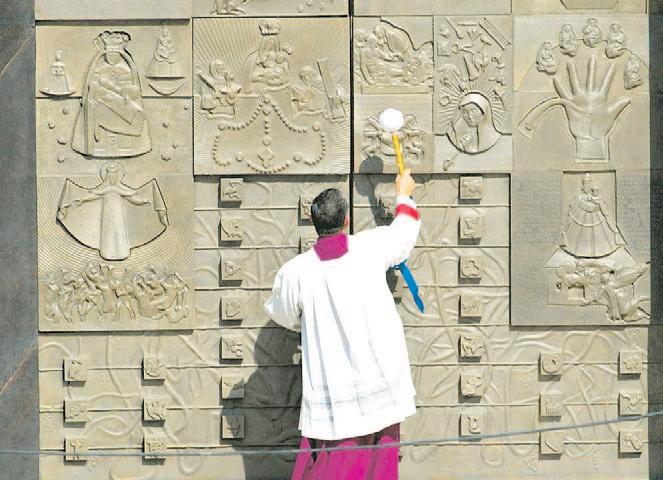
of losing our religious freedom – and therefore any hope of a true understanding of human dignity – because our secularist, materialist society is demanding that spiritual and moral values have no place in community life. Unfortunately, most of those who should reject this new tyranny by default have already allowed the spiritual and moral values that defeated Communism to slip from their grasp.
That is why it is time for Catholics to return home to the Church and to stay there. Poland is a place where faith and deep piety were considered normal and admirable in the young and the adult. That is why Poland could trigger such a profound moral revolution, and why she could produce such a remarkable Pope.
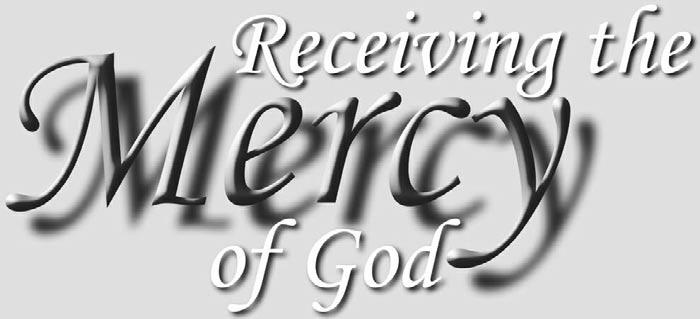


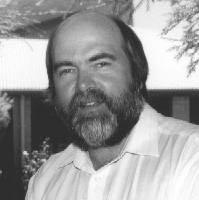

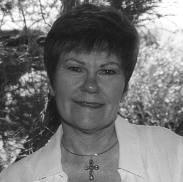
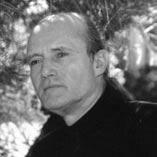

Here in our own Catholic schools, faith and deep piety are not considered normal or admirable. How many Catholics realise that children who attend Mass and Communion every week with their parents and pray with their parents at home find themselves being in a small minority in Catholic schools?
That is why it is time for Catholics to return home to the Church and to stay there. It is time to put aside the delay and seek our own personal revival.
The personal nature of the human encounter with God is the centre of every human life, and without it we lose what is most truly human in each of us. It is an encounter that each one must seek out and experience for himself. No one can force you into it and no one can do it for you, but it must be done.
There are great things moving in our world today, and one of them is the spiritual and moral revival being led by the young.
It can be seen most obviously in their intense response to the Pope’s trust in them, but those who are looking can also see it in many other ways.
They are thirsting for a better understanding of the fullness of humanity than secular materialism has been offering them.
The answer is Jesus because he is the only answer to the riddle of humanity.
It would be a great thing if the young could hear the sound of their parents’ and their grandparents’ footsteps returning to the Church that Jesus created for us and in which he sits silently in the tabernacle waiting for you to ask him what he would like you to do.
There is a great family of love waiting for you, but the choice is yours alone. It is becoming urgent.
Taking your kids to Mass. Just do it - Catherine Parish: Page 7 You’re here now, make it a habit - Paul Gray: Page 11
Everything you were afraid to ask... - Pages 12&13
Fr John McCloskey’s guide to spiritual reading - Page 21
The gifts that converts bring to the Church - Page 22

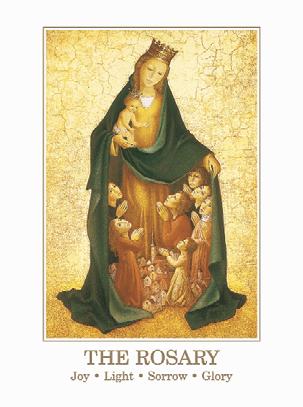
“Duc in altum!” – “Put out into the deep”.
Pope John Paul II has chosen these words of Jesus as the watchword of the Church as she advances with a firm and confident step into the third millennium. Now he has shed new light on the Holy Rosary for us too, and has entrusted it to us as a priceless means of help as we venture forth into the “vast ocean” of the new millennium. By adding the five Luminous Mysteries the Holy Father has enriched our prayer life. The Rosary booklet contains all 20 mysteries as well as excerpts from the Holy Father’s apostolic letter Rosarium Virginis Mariae, scripture readings, meditations and prayers.
This booklet is intended not only for those who have already enjoyed a Christian upbringing, but also for all those who were deprived of this and are therefore unfamiliar with the great treasure that is the Rosary. This beautifully illustrated little booklet is now available fora donation of $3.00 (includes postage). Also available are the Papal Rosary beads. To obtain the Rosary booklet and the Vatican Rosary beads we ask fora donation of $15.00 (includes postage). All proceeds will go towards the work of Aid to the Church in Need for the persecuted and threatened Church worldwide.
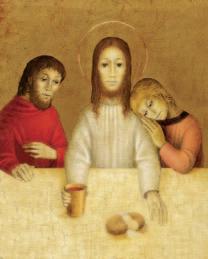

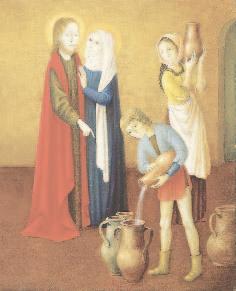
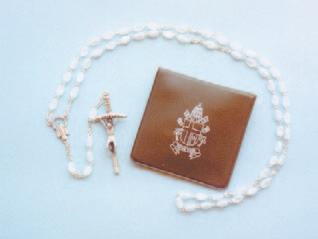

The Rosary – Joy, Light, Sorrow, Glory Aid to the Church in Need launches new Rosary booklet Featuring the 5 new Mysteries of Light Order Form: “The Rosary – Joy, Light, Sorrow, Glory Send to: Aid to the Church in Need, PO Box 6245 Blacktown DC NSW2148 Phone/Fax No: (02) 9679-1929 E-mail: info@aidtochurch.org Web: www.aidtochurch.org Please send me: Number Amount The Rosary booklet ($3)* OR The Rosary booklet and the Vatican Rosary beads ($15)* Charity donation (optional) . . . . . Total enclosed . . . . . *Postage included. Limit of 5 copies per order Signature . . . . . . . . . . . . . . . . . . . . . . .Exp Date . . ./ . . . BLOCK LETTERS PLEASE Mr/Mrs/Miss/Ms/Rev . . . . . . . . . . . . . . . . . . . . . . . . . . . . . . Address . . . . . . . . . . . . . . . . . . . . . . . . . . . . . . . . . . . . . . . . . . . . . . . . . . . . . . . . . . . . . . . . . . . . . .Postcode BankcardVisaMastercard Payment method:Cheque/money order enclosed OR Please debit my credit card AID TO THE CHURCH IN NEED A Catholic charity dependent on the Holy See, providing pastoral relief to needy and oppressed Churches PG Beautifully illustrated throughout. Just $3 a copy or$15 forthe Rosary booklet and Papal Rosary. A lovely gift idea!
POBox 75, Leederville, WA 6902 Tel:(08) 9227 7080, Fax: (08) 9227 7087
cathrec@iinet.net.au
The Record CHRISTMASEDITION 25 DECEMBER 2003 3
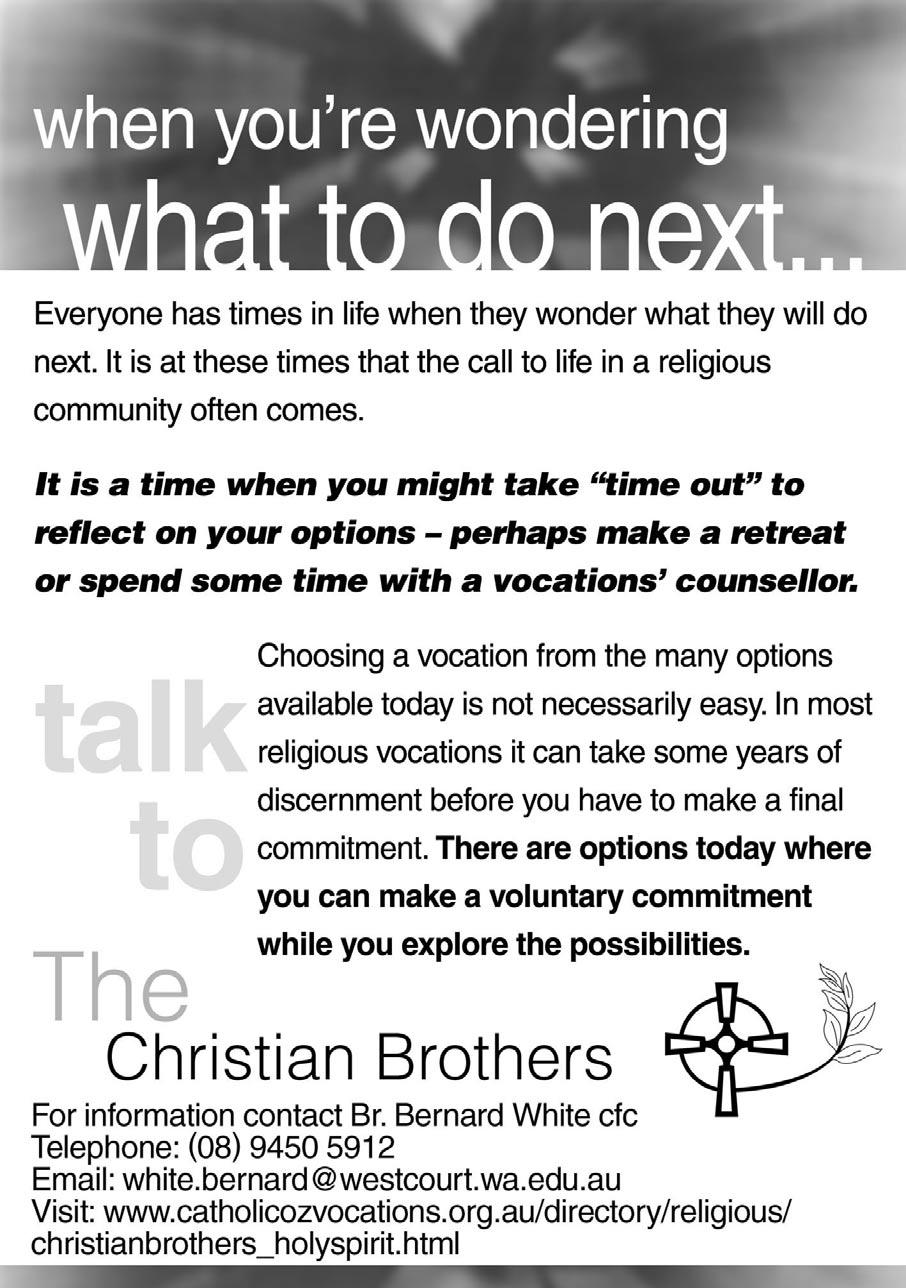
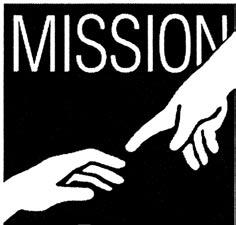
Catholic Mission
23 Victoria Square
Perth WA 6000 PH: 9325 5264
On behalf of missionaries everywhere and the people they serve, Francis, Dellas, Michelle, Joanne, and Joan from the Catholic Mission Office here in Perth would like to thank you for your prayers and continuing support throughout 2003. May you and your families know the Peace and Love of Christ during this Christmas Season and throughout the New Year.
Get creativenot mechanic
Fr Tim offers suggestions to teach your childrenand yourself - that prayer as a family is natural
Christmas is a season of miracles, and today’s family members who manage to pray together may feel like they’ve pulled off a minor one! But family prayer need not be a daunting prospect. The holiday season is a good time to reexamine the possibilities: school is not in competition with family life, and the new year is a good time for a resolution to pray together. But how? When?
Mealtime
Many Catholic families still begin their main meal together with grace: ‘Bless us, O Lord, and these thy gifts . . .’ But a
Send questions to: The Record PO Box 75
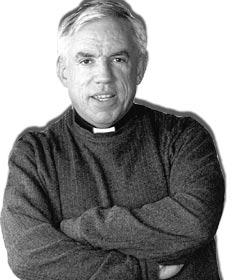
DEARPADRE
simple devotional prayer like this can become mechanical for everyone, adults and children alike; and prayer should not be mechanical.
Perhaps a better time to focus on prayer would be at the end of the meal, when all the rush of getting the meal on the table is past. Here are a few ideas: Keep a bible in the dining area. (Not the good one given as a wedding gift years ago – get an inexpensive paperback version with an easy-to-read translation, like ‘Good News for Modern Man’.) At the end of the meal, one of the family members can read a short selection. Then the reader adds a personal comment: ‘I think this means . . .’ Others can also add their own reflections if they wish. Close with the Lord’s Prayer. The bible reading can be prepared beforehand, or chosen at random. However, it might be a
good idea to select a section of the scriptures and read it ‘serially’, few verses at a time, meal by meal. Such sections could be:
● the Christmas story (Matthew 1:18 – 2:23; Luke 1, 2)
● the Sermon on the Mount (Matthew 5, 6, 7)
● some parables of Jesus (Matthew 13)
● some teachings of Jesus (Matthew 18)
● the Passion and Resurrection (Mark 14 – 16)
● spiritual gifts (1 Corinthians 13)
● family advice (Ephesians 6)
● love for God and one another (1 John 4:7-21)
Make a family prayer list. It’s easier to pray if there is something or someone as a prayer intention. The children can make a weekly or monthly
FEAST OF DIVINE MERCY IN POLAND
SHRINE OF INFANT OF PRAGUE IN CZECH REPUBLIC
A 12-day Pilgrimage with Fr Timothy Deeter April 12-23, 2004 - $1580 (land only)
Warsaw * Krakow * Niepokalanow * Jasna Gora * Auschwitz * Zakapane * Prague
Shrine of Our Lady of Czestochowa * Original Image of Divine Mercy * Convent of St Faustina * Friary of St Maximilian Kolbe * Calvary Shrine * Piekary Slaskie Shrine * Birthplace of Pope John Paul * Original Statue of Infant of Prague * and much, much more!
LAND PRICE INCLUDES:first or tourist class hotels w/private facilities * breakfast & dinner daily * one lunch * tours & entrance fees * A/C motorcoach * all transfers * service charges & hotel taxes * professional tour director
FOR MORE DETAILS / TO APPLY:
Pilgrimage * 50 Vincent St * Mount Lawley WA 6050 tel:9328 4518 * fax:9328 4519 * email:casapgf@iinet.net.au


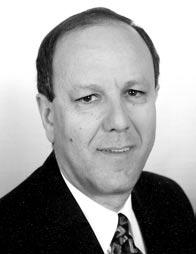
Continued - Page 23
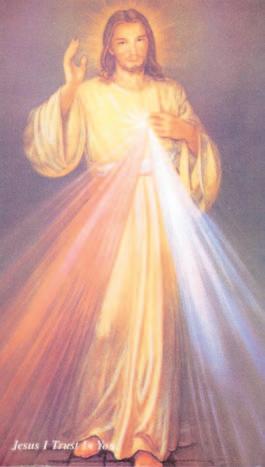

Sale Post Christmas Sale
We wish to thank all our valued customers for your loyalty and support throughout 2004 and look forward to continuing our relationship in the coming year. Wishing you a Safe and Blessed Christmas and New Year.
Mr Denis McInerney cordially invites the Catholic Religious Orders and WA’s Catholic Community to contact our representative, Mr Paul Zappia, for your next new vehicle.
Paul Zappia 239 Walter Rd, Morley (opposite KFC) Phone 9275 1222 website: www.mford.com.au email: fordsales@mford.com.au A/Hrs 9275 1531 DL 2371 Gatto Christian Shop Retailer of Religious Gifts,Churchware and Books
Christmas
Starting: Saturday, 27 December 2003 until Saturday, 3 January 2004 ● 4 0 % o f f C h r i s t m a s I t e m s ( i n c l N a t i v i t y S e t s & S t a b l e s ) ● 2 0 % o f f C h r i s t m a s B o o k s ● 1 5 % o f f C h u r c h w a r e , B o o k s , C a n d l e s , I n c e n s e & C h a r c o a l ● 2 5 % o f f a l l o t h e r i t e m s i n s t o r e (excludes altar wine, altar bread, CD’s, Videos, Cassettes and Software – Discount only applies to RRP only). 1 0 8 W a n n e r o o R o a d , T u a r t H i l l W A 6 0 6 0 P h : ( 0 8 ) 9 3 4 5 5 7 0 0 F r e e f a x : 1 8 0 0 2 4 2 8 8 6 E m a i l : s h o p @ g a t t o c o m a u
Mr
Post
6902
LEEDERVILLE WA
The Record CHRISTMASEDITION 4 25 DECEMBER 2003
A CHRISTMAS MESSAGE from Broome
Bishop Christopher Saunders
Christmas is an excellent time for counting our blessings and striving more than ever to learn to live our lives with a generous heart. Some years ago I was approached to support a local scheme that raised money to buy and distribute children’s toys for Christmas.
I congratulated the secretary of the community group doing the fundraising on their enthusiasm. "Well" she said, "its for the kids and after all Christmas is for kids, really, isn’t it?" I agreed. I certainly wouldn’t deny that.
But I suggested that one Christmas present that is waiting to be discovered by many of us is the wonderful blessing that Christmas promises the world.
In the happy faces of children on a Christmas morning we can find something deeper and more meaningful and more lasting than mere momentary pleasure.
In prayerful contemplation we can see what goodness there is in giving.
We can be inspired to live our lives selflessly as we learn to be grateful to our loving God for His generosity to us. Christmas, we will come to appreciate, is for everyone.
In that stable in Bethlehem there were no high tech toys but there was happiness.
The poor cloths that wrapped the baby as he lay in his simple manger had no designer labels on them but there was care-filled joy nonetheless.
There was no feast to be had, no puddings to devour, and no presents to unwrap but there was contentment and peace.
The marvel of Christmas begins with the generosity of God. God who loves and gives. God who nourishes and sustains. God who carries us beyond the terrible disappointments that impact upon us with remarkable regularity.
God in His goodness leads us always onward to find meaning and direction in our lives.
The incarnation, whereby God’s only Son entered into humanity and became flesh, is the story of

God’s blessing for us. It is his gift designed to show us a way of living that fulfils our humanity, which allows us to become more fully human, as in the image of the One who created us.
God’s gift to the world that first Christmas gave us the Messiah, the Chosen One, who’s every moment of life has been an example of grace and generosity.
This gift is made ever present still today through the work of the Holy Spirit among us.
With such a realization in our hearts we thrive, fulfilled, as He intended.
Look in the beaming face of a jubilant child and see more than just momentary happiness. See for yourself a life of peace and contentment. Know what joy there is in human fulfillment when life is regarded as a gift to be cherished and shared as generously as it was given by the God who loves us.
Wishing you all the blessings of a Holy Christmas.
M e s s a g e s c o n t i n u e d o n p a g e 2 0
A WISEMANONCESAID
Chesterton died twothirds of a century ago, yet would anyone dare to say that these quotes are out of date?
The Christian ideal has not been tried and found wanting. It has been found difficult; and left untried. -What is Wrong with the World.
A new philosophy generally means in practice the praise of some old vice. -All Things Considered.
Pessimism is at best an emotional half-holiday: joy is the uproarious labour by which all things live. -Orthodoxy.
The true object of all human life is play. Earth is a task garden; heaven is a playground -A Motley Wisdom.
I am proud of being fettered by antiquated dogmas and enslaved by dead creeds (as my journalistic friends repeat with so much pertinacity), for I know very well that it is the heretical creeds that are dead and that it is only the reasonable dogma that lives long enough to be called antiquated. -Autobiography.
Christianity has died many times and risen again; for it had a god who knew the way








out of the grave. -The Everlasting Man.
The secret of life lies in laughter and humility. -Heretics.
Virtue is not the absence of vices or the avoidance of moral dangers; virtue is a vivid and separate thing, like pain or a particular smell. Mercy does not mean not being cruel or sparing people revenge or punishment; it means a plain and positive thing like the sun, which one has either seen or not seen. Chastity does not mean abstention from sexual wrong; it means something flaming, like Joan of Arc.Selected Essays.
[With the coming of Christianity] we must be much more angry with theft than before, and yet much kinder to thieves than before. There was room for wrath and love to run wild. And the more I considered Christianity; the more I found that while it had established a rule and order, the chief aim of that order was to give room for good things to run wild. -Orthodoxy.
WANTSOMEGOOD REASONSTORETURN
SEE pages 11 to 13.


TO THECHURCH?
The Record CHRISTMASEDITION 25 DECEMBER 2003 5
Along the ancient pilgrim’s way to the Shrine of St James in Santiago. Join the streams of pilgirms who have walked this sacred road for over a thousand years.
Departs 26 February 2004 with Fr Terry Hoare
16 April
Departs 2 April with Franciscan Friar Fr Bob Matthews OFM Fr Gerard Dowling: departs 27 May Fr Peter Luton: departs 5 Sept Departs 17 May, 17 July (Feast of St James), 19 Sep (walking tour) and 18 Oct 2004. Departs 10 June with Fr John Shallvey MSC Also 9 May, 10 Sept & 10 Oct ‘04 from Also 1 Oct ‘04 with Bishop John Dew (NZ) - $4870 Departs 5 May, 28 Jun, 29 AugFr Andrew Grace & 29 Sept 2004 Also ask about Grotto in Lourdes Also departs 5 November Also: 5 March, 14 May, 18 Jun, 27 Jul, 7 Sep, 8 Oct ‘04 Fr Gerard Dowling: departs 9 June Fr Peter Luton: departs 18 Sept - $4595 A rare opportunity to experience Palm Sunday celebrations in Rome & Easter/Holy week celebrations in Assisi Flightworld Travel Perth(08) 9322 2914 • Travelscene Lords(08) 9443 6266 from
Departs
with Fr Frank Perry MSC for the
For God’s glory
 By Jonathon Miller
By Jonathon Miller
The challenge given to our cover artist, Titane Laurent, was to create in less than ten days a Nativity piece that would touch all our readers.
Now this may not seem like such a big deal, but Titane has spent the last 8 years creating abstract works, so taking a glance at the front cover reveals a big departure from her normal style. For this piece she first spent several days poring over books of religious paintings
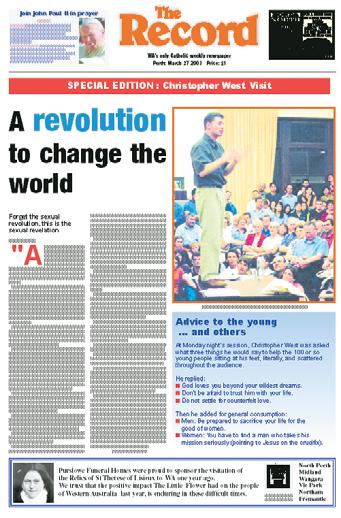
by the old masters. Titane says she then took some "time out" at the Monastery in New Norcia, gaining inspiration from the religious art works there and the knowledge of the Monks. Making use of the tranquillity of the surroundings, she says she found completing the work to be a rewarding experience. So much so that she now plans to paint more traditional iconic works. She says she thinks that the biggest challenge however, was for her husband to look after their two children while she was away.
Titane has exhibited her art in
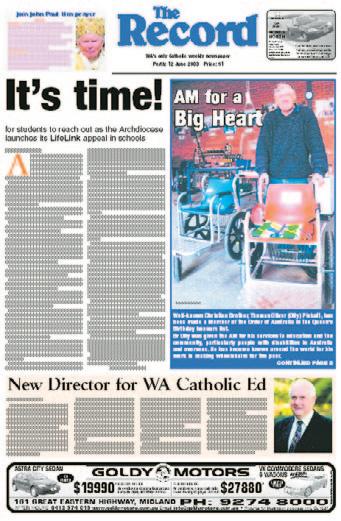
Belgium, Luxembourg, New Zealand and here in Perth, including winning first prize in this year’s Town of Mosman Park Art Awards. She says that no matter weather she is working on conceptual art or a religious piece, she always prays before beginning and then gives the result to God, trusting that he will guide her as she creates.
In this way she experiences a great sense of peace as she works, knowing that the result is not about her own ego, but God’s glory.


We would like to thank all
valued clients, friends and family for their support through the year and wish you all a safe and Merry Christmas.






The Record CHRISTMASEDITION 6 25 DECEMBER 2003 F amily Subscription to The Record For a limited time only when you subscribe to The Record for 1 year at $55 you will receive a 2004 Scripture Diary F R E E (valued at $12.95) Name Address Suburb Postcode Telephone I enclose cheque/money order for $ Please debit my ■ Bankcard ■ Mastercard ■ Visa Card No ■■■■ ■■■■ ■■■■ ■■■■ Expiry Date: / Signature: Send to: The Record, PO Box 75, Leederville WA 6902
Titane at work on the front cover picture of The Record.
he Record is our own Catholic weekly newspaper.It tells us what’s happening in the Church locally and internationally. The television and the daily newspaper don’t give much space to the Church and when they do, it’s often negative. Find out what is really going on. There is always something in The Record to interest and inspire every member of the family. Subscribe to make sure you get it every week. JOURNEY OF FAITH Czestochowa Krakow ● Prague ● Medjugorje ● Rome San Giovanni Rotondo ● Assisi A 21 day pilgrimage journey to some of the great centres of our Catholic faith heritage. priced at $6495 FREE STOPOVER IN USA/CANADA & $150 EUROPE/UK FLIGHTS conditions apply Call Travelscene Lords Ph:9443 6266 Personally escorted by Fr Irek Czech SDS Home Satellite & V ideo Systems Phone 9472 7977 Mobile 0412 285 362 Unit 1b, 12 Milford St,East Victoria Park WA6101
our
Up for a challenge?
CATHERINE PARISH finds it’s one way of guaranteeing you meet the people seated beside you.
Ihad to take the children to Mass without my husband recently. It began as usual. Seated in the Church (which will remain nameless for reasons that will become obvious) decorously, four little people, Mum and the baby.
Quickly tiring of flirting with the family behind, baby began to protest at ever increasing volume at his confinement in mum's arms. OK. Off we went for a feed. Just got back into our seat when Baby produced a "stealth vomit", splashing loudly onto the back of the next pew and narrowly missing (well, almost completely) the lovely, dry-clean-only wool coat of the lady in front.
Much to her very understandable disgust, and the (highly reprehensible) amusement of my other four children.
And it was pretty much downhill from there. Here is a word of wisdom from sad experience - if a seven year old tries too hard to smother his giggles, something must 'out' somewhere.
A series of appalling odours engulfed us -not the odour of sanctity, I can tell you. By this time the whole pew was shaking as Mum attempted to discreetly mop up and restore
order while trying not to breathe in too deeply.
Meanwhile, baby's antics escalated to the point that Mum finally admitted defeat, grimly warned the four older children to be good and took baby out.
The children’s room was now packed to the plimsoll with families wiser than I. Ignoring the freedom of the foyer, baby fixated upon the swinging door into the church.
Nothing would distract him from it, and he was deriving unholy glee from the swish, creak, thump, right from the middle of the sermon to Holy Communion time. It is experiences like this that make Sunday Mass sometimes seem like just another chore.
We parents are right at the coalface of life. All the time, working, working, working, to provide for our families, to maintain our homes, to keep our marriages happy (or even sometimes just together), to keep our children happy (or even sometimes just apart).
It's hard - gruelling sometimes - to get to Mass every Sunday, rain, hail or shine. But Jesus knows that - he is man as well as God. He never asks us to do things that are impossible (though they might be challenging at times).
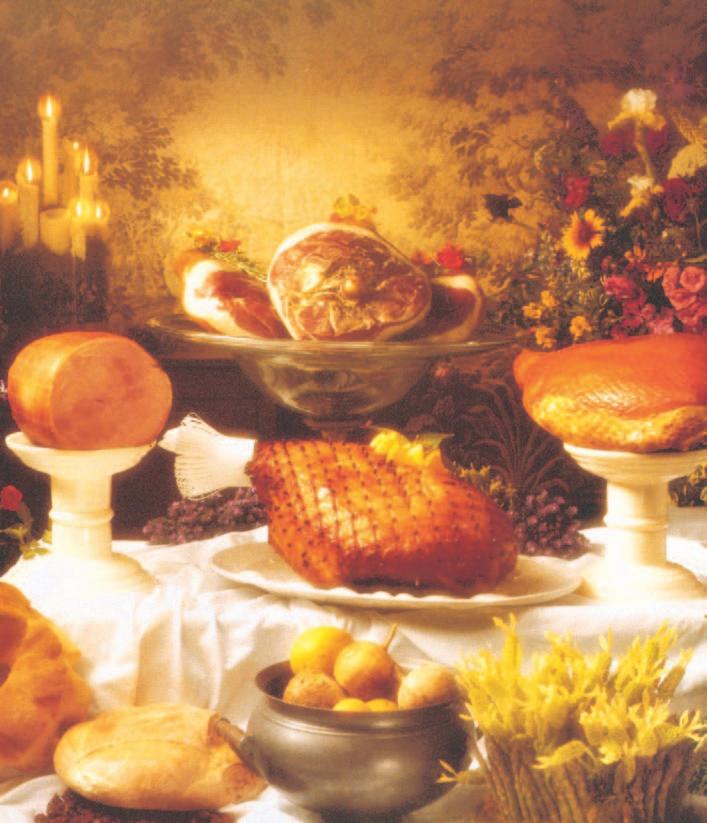
Our Catholic faith is meant to be the anchor that keeps us from being washed away in the hectic tide of modern life, not a millstone round our necks that drags us down.
The Catechism of the Catholic Church explains it a whole lot better, with great beauty and wisdom, but the upshot of it is that we need Mass pretty desperately and that is why the Church is still so insistent about regular attendance. The grace we gain from going to Mass and uniting with Jesus really and truly present upon the Altar, there because He loves us so much, is what gives us the strength of purpose to persevere patiently, hopefully, and (mostly) joyfully with our lives during the week. Our hope is refreshed every time we go to Mass; just as Christ triumphed over suffering and adversity so eventually will we. So hang in there, Catholic parents!
You are not alone. Take comfort from the fact that your children are not the only ones in the Church fidgeting (though it always feels as if they are). And it is one hour out of every 168 when you can feel positively virtuous that you are not
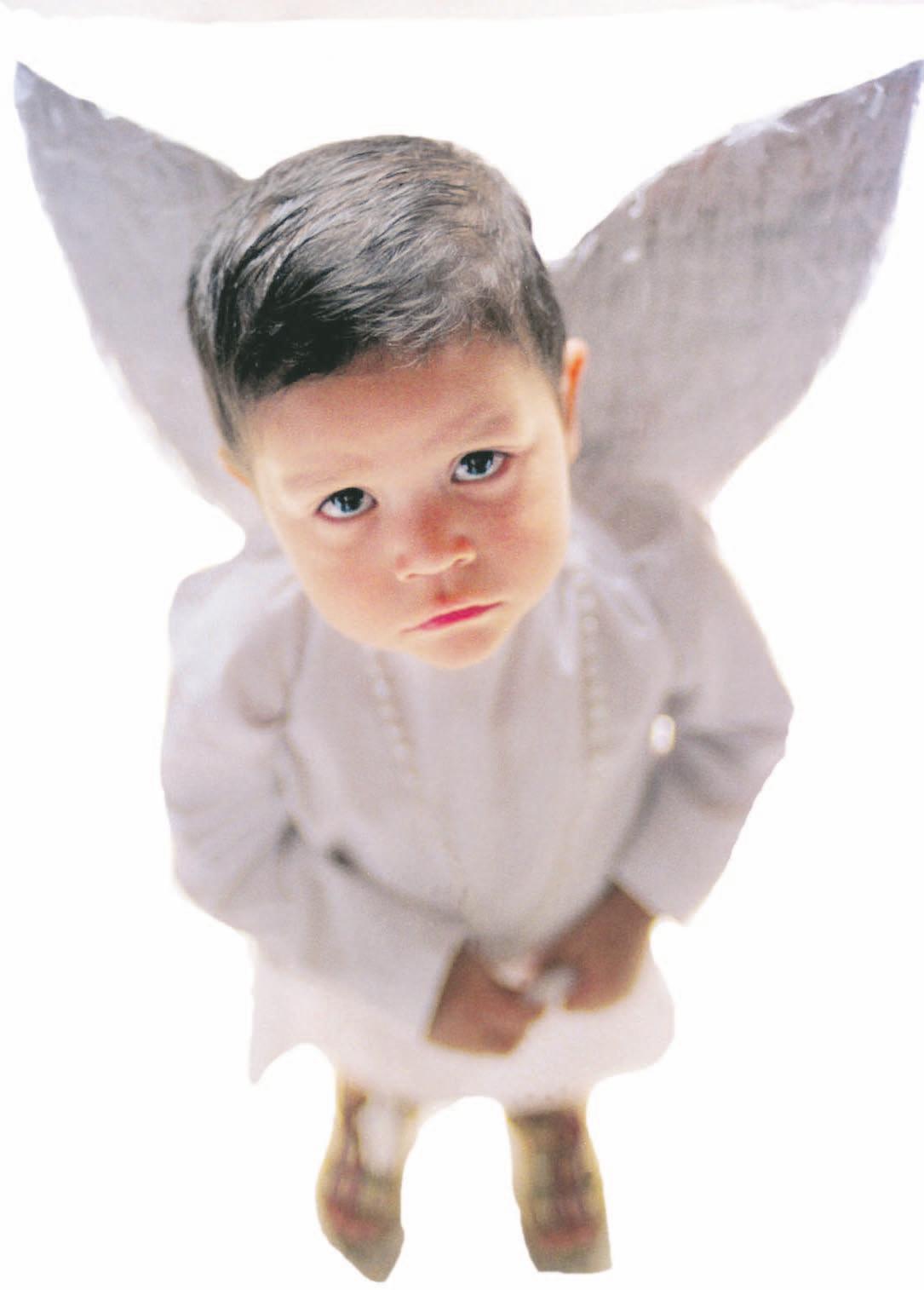
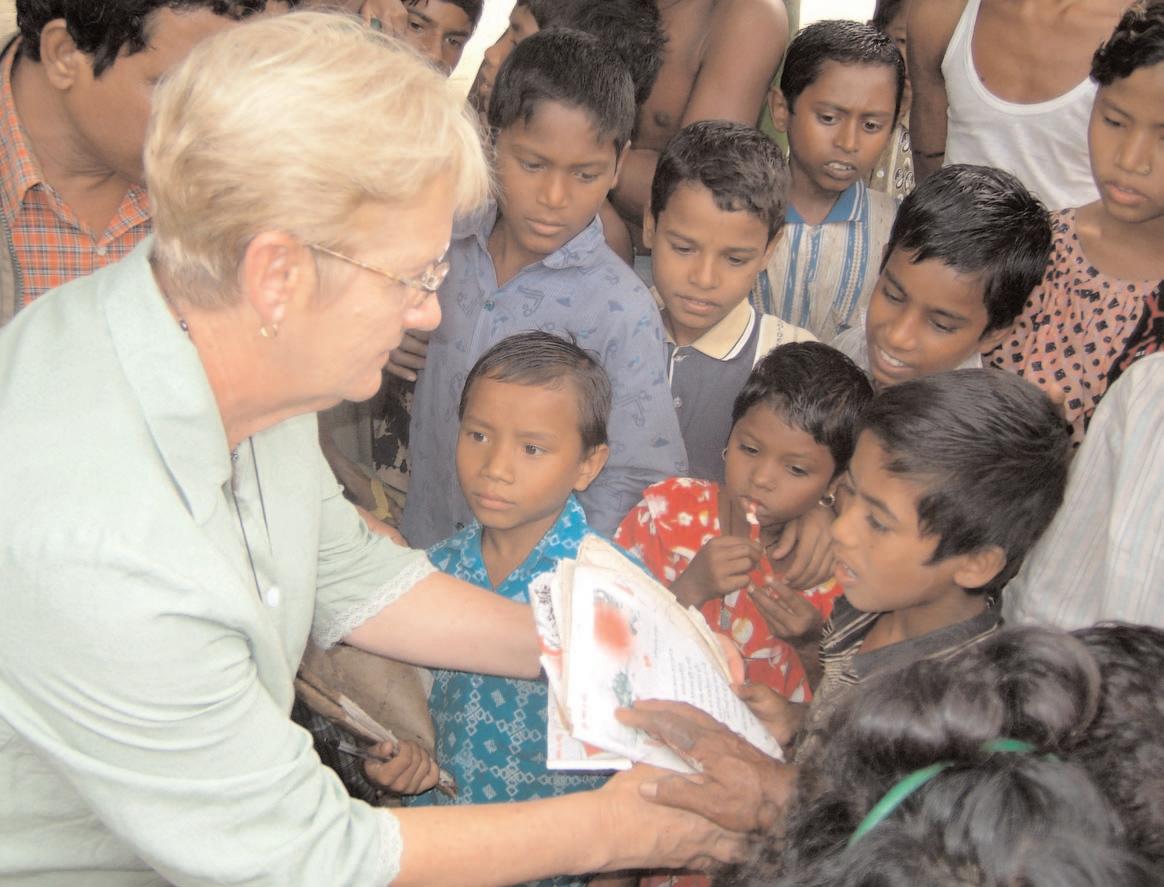
the ironing, cleaning the car, or weeding the garden.
doing
Take the
kids to Mass
The Record CHRISTMASEDITION 25 DECEMBER 2003 7 The D’Orsogna family and staff wish you and your family a very merry Christmas and a safe and prosperous New Year. Caritas Australia changes lives Yes, I want to make change happen Mr/Mrs/Ms/Miss _______________________________ Address:_____________________________________ Postcode:___________ Amount: ❏ $100 ❏ $80 ❏ $60 ❏ $30 ❏ Other $________ ❏ Please find my cheque enclosed or ❏ Please debit my card B/C, MC, Amex, Diners, Visa Card No __ __ __ __/ __ __ __ __/ __ __ __ __/ __ __ __ __ Exp date __ __/ __ __ Signature:______________________________________ ❏ Please send me information on regular giving and bequests. Please return to 29 Victoria Square,Perth WA 6000 ■ ■■■■ ■ ■ ■■ ■■■ ■ www.caritas.org.au Donation hotline 1800 024 413
from East Timor aLetter of THANKS

Advice to pharmacists
a statement from the Catholic Church’s LJ Goody Bioethics Centre
All Catholics, especially Catholic Pharmacists, should be advised that the product Postinor-2 may be available for sale over the counter in pharmacies from January 1.
It is important to note that this product called "morning after pill" or "emergency contraception" or in the Vatican's phrase "chemically induced abortion" is in fact on moral considerations an abortifacient (an agent of abortion), even if sometimes legal considerations term it a contraceptive on the basis of it being termed "interception" (preventing implantation of the fertilised ovum) rather than "abortion" (expulsion of the embryo from the uterine wall).
The Vatican's Pontifical Academy for Life mentioned in October 2000, that this pill is an abortifacient not withstanding the efforts of some to see it as only a contraceptive. Since one effect of it is to expel an already fertilised ovum, i.e. embryo, from the woman's body, it comes under the veto on abortion constantly repeated in Catholic Church documents. No Catholic of good conscience may approve of such an abortifacient, recommend it, or be involved in having it made available to patients be it within medical clinics or pharmacies. The Vatican statement and all further information are readily available from the L J Goody Bioethics Centre.

TheSalesiansin EastTimor
Helping with some essential building blocks needed to re-build a new nation.
Dear friends in Western Australia, I
write to express thanks for the help have given to our schools in response to the request in The Record.
As you may know, Laga is still suffering from the effects of drought over the past two years, and hence food is in short supply locally. Within the Parish there are 45 primary and three Junior High schools with more than 6000 students.
One of our big concerns is that many, many children are walking long distances to school, for an hour
or more, without having had breakfast.
And students who are hungry are unable to give full attention to their schoolwork. In addition, every day several youngsters faint at school.
You may recall I said a few months ago that one of my dreams was to introduce a School Luncheon Program. Well, this dream is now coming true; thanks to the support we have received from Australia via the Salesian Missions Office [PO Box 80, Oakleigh Vic 3166.].
We started the Program in four centres at the beginning of October.
For five days a week, at about 10.30 a.m., a meal of cooked rice is provided at Laga (250 students), Baguia (250 students), Quelicai (150 students) and Hosuna (70 students). The rice is supplemented by meat on two days and with vegetables on
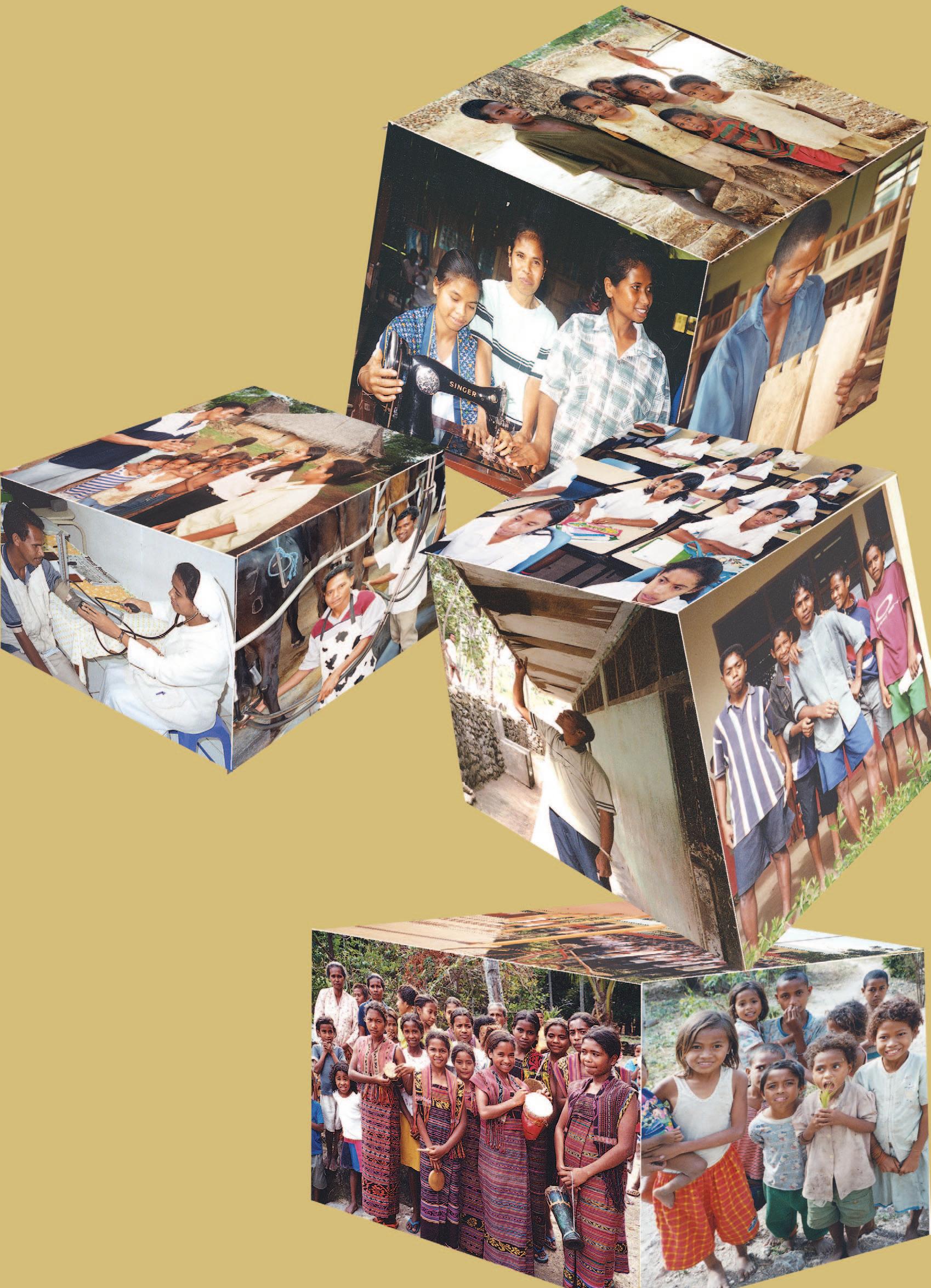
"I am most grateful for the generous help Salesian Missions in Australia has given this year to our schools …
"Here in the Laga Parish there are three orphanages, 45 primary and three Junior High schools with more than 6000 students…
"With the help we received from Australia, the schools are still operating… HOWEVER most buildings are in very poor shape and I fear that several may collapse in strong winds …
"In this area food is in very short supply… many little children come to school without breakfast …with your help we have started a schools luncheon programme…
"Right now we are in the dry season… September to March is always a critical time for our people…
"Thanks very much for supporting of our efforts to rebuild…"

10 December 2003
October 6, 2003 The Record CHRISTMASEDITION 8 25 DECEMBER 2003
Fr Marcos de Oliveira Parish Priest Laga
the other three.
The response to our School Luncheon Program has been truly fantastic. The children are very happy. And the teachers tell me the youngsters are now showing much more enthusiasm and interest in their studies. Morale has been boosted all round.
Praise the Lord !
With your assistance we have started a really great project. The children and their parents are most grateful for your generosity. We are all praying for you and your intentions.
However, to introduce this program to the other schools in the Parish we have to purchase more pots and cooking utensils.
I am also keen that each school has its own vegetable garden where the teachers and students
will work together in the growing of vegetables. We have just received a quantity of gardening tools from Australia that I will distribute to the schools to help promote this idea.
While we are praying for you, I ask you to pray for us in the Laga parish– the Sisters, the teachers and students and their parents, and the priests.
I wish you the Lord’s blessings and peace during this Christmas – a time to reflect on the birth of Christ and all that it means in today’s world.
Yours sincerely in St John Bosco,
(Fr) Marcos de Oliveira, SDB Parish Priest St John Bosco Parish Laga, East Timor
2000 babies - and none lost

In early November Ann Fairhead (Caritas Diocesan Director from Perth) joined Jim Eves (Caritas Australia Development Network Coordinator) from Sydney and Caritas Australia Directors’ from Adelaide, Ballarat and Lismore to visit a number of
The provision of clean water is the biggest single advance in human health anywhere in the world.
Caritas helps to provide clean water in many countries.
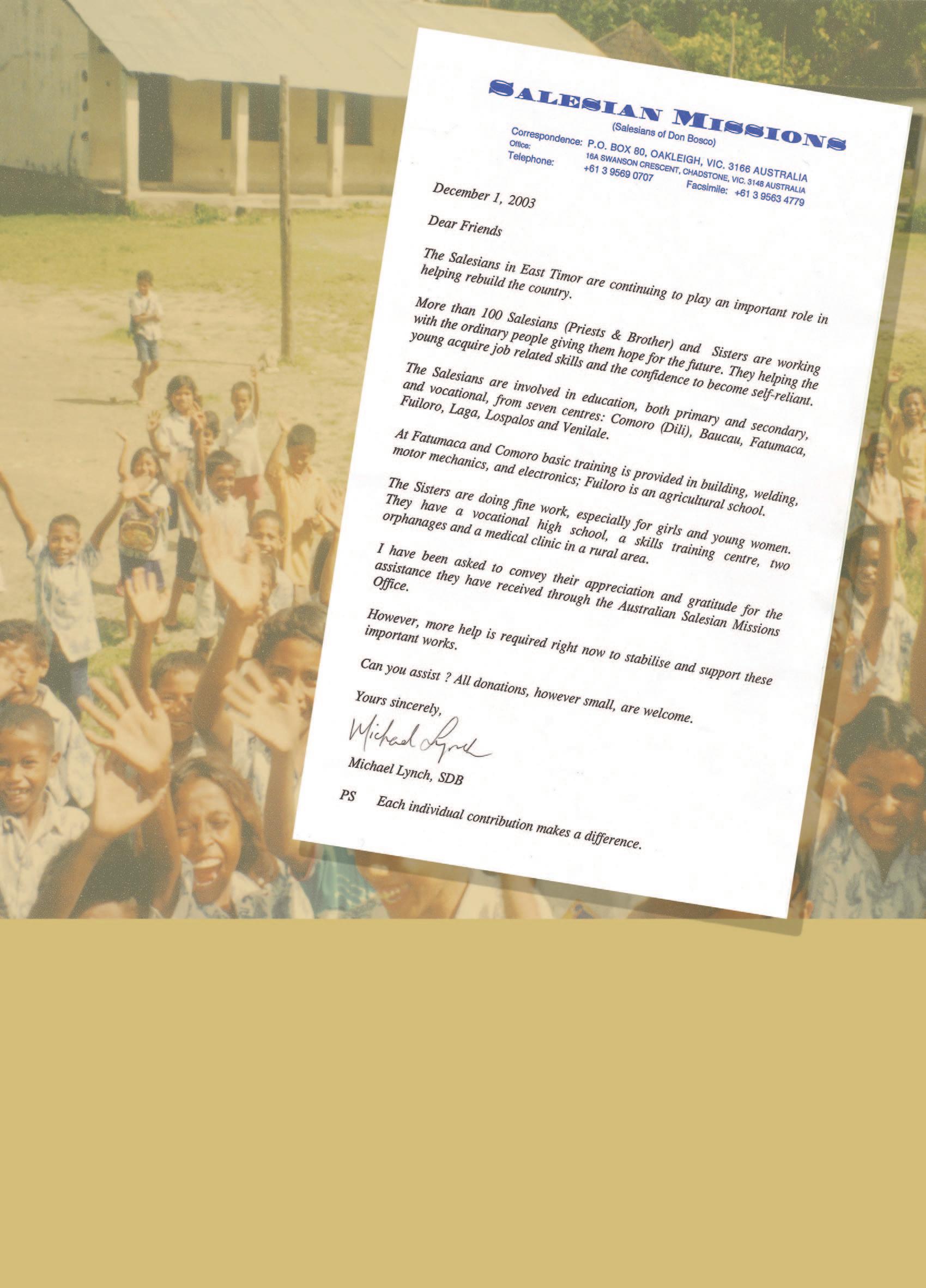
East Timor CAN YOU HELP? East Timor
December 1, 2003
Dear Friends
The Salesians in East Timor are continuing to play an important role in helping rebuild the country. More than 100 Salesians (Priests & Brother) and Sisters are
programs that Caritas Australia supports through Caritas Bangladesh and APHD, the Asia Partnership for Human Development.
APHD is an association of 23 Catholic Development agencies from Asia, Belgium, England and Wales, Canada, Australia and New Zealand. Bangladesh is a green fertile country with many rivers where 140 million people live in an area the size of Victoria, one third of which is subject to flooding.
Ann was particularly impressed by the Community
Health Natural Family Planning Program and in particular the Village Midwife Program, which commenced in 1998
● Bangladesh and India account for 70% of all maternal deaths in the world
● Three women die every hour in Bangladesh from pregnancy related causes, due mainly to preventable causes
● Only 5% of all Bangladesh women receive professional assistance during pregnancy.
Since the program began
● not one mother has been lost
confidence to become self-reliant.
The Salesians are involved in education, both primary and secondary, and vocational, from seven centres: Comoro (Dili), Baucau, Fatumaca, Fuiloro, Laga, Lospalos and Venilale. At Fatumaca and Comoro basic training is provided in building, welding, motor mechanics, and electronics; Fuiloro is an agricultural school.
working with the ordinary people giving them hope for the future.
They are helping the young acquire job related skills and the
The Sisters are doing fine work, especially for girls and young women. They have a vocational high school, a skills training centre,
two orphanages and a medical clinic in a rural area. I have been asked to convey their appreciation and gratitude for the
these important works.
assistance they have received through the Australian Salesian Missions Office. However, more help is required right now to stabilise and support
Yours sincerely,
Can you assist ? All donations, however small, are welcome.
Michael Lynch, SDB
PS Each individual contribution makes a difference.
● nor has their been an incident of serious complication
● 200 women have been trained
● there is a desire to extend the training so that they can practise as Rural Health Practitioners as It is very difficult to get doctors or trained nurses to live and work in the rural districts. Prospective midwives are chosen from those with education to Year 10 who will remain in the village.
Men and women in the remote villages proudly share the fact that the Village Midwife program has meant that they now have better health, eat better food, practise safe hygiene, drink clean water, have good sanitation practices and are educated to recognise signs which indicate a pregnancy problem. One midwife has delivered approximately 2000 babies in eleven years with no loss of life.
Other offshoots are that the women now enjoy good health, meet with other women, pool clinic expenses, are immunised and able to read and write.
The Australian visitors reported that Caritas Bangladesh were truly inspirational hosts and that they are eager to share stories of these innovative and resourceful people.
For contact details see advertisement on page 7.
APHD strives to promote a model of development assistance, which emphasises solidarity and mutual sharing amongst member agencies and grassroots groups. It draws its inspiration and vision from scriptures, the social teachings of the Catholic Church, and the poor in Asia whom it accompanies in their struggle for social justice and human development.
Enclosed please find my donation $ for Salesian projects in East Timor. OR: Please debit my - (tick one) ❏ Bankcard ❏ Visa ❏ Mastercard Amount $ Card Number:
Signature:Expiry Date:
Address: P/code:Phone: ✃ SALESIAN MISSIONS SALESIAN MISSIONS
Cardholder’s
Name:
Please send your donation to: SALESIAN MISSIONS POBox 80, Oakleigh 3166 Salesian Missions: Australian Salesian Mission Overseas Aid Fund (ASMOAF) ABN 43 206 946 086 Donations for the alleviation of poverty through development projects are tax-deductible. Funds contributed for religious purposes such as the building of churches and the education of seminarians, though welcome, do not qualify for a tax-deductible receipt.
The Record CHRISTMASEDITION 25 DECEMBER 2003 9
photo:CNS
BAT MAN
MATTHEW HAYDEN has conquered his game. Barry Gittins asks Hayden what drives him to succeed.
It may be a cool 13 degrees in Melbourne, but there’s nothing chilly about Queensland-based cricket champion Matthew Hayden’s telephone manner.
Revelling in the subtropical idyll of Stradbroke Island with wife Kelly and 17-month-old daughter Grace, Hayden doesn’t even begrudge the fact that he has had to cut short his beloved surfing to take part in this interview. There are much more important things in life, he says, than catching a wave.
‘I don’t get much time at home, so it’s important to have a place that’s Kelly’s and mine,’ he says, ‘where we can get away together.
‘We’re pretty lucky, we’ve got a beautiful little baby and we’ve had a great journey together as well— full of ups and downs, but we’ve stayed together on things.’
It’s a month or so before the lefthander hits that score—a visibly effortless 380 runs—against a pedestrian Zimbabwean attack, surpassing the 334-run Aussie record of Don Bradman and Mark Taylor, and Windies champ Brian Lara’s former world record of 375.
Hayden’s reached the pinnacle of a career built on talent, power, sweat and grit. But life hasn’t always been this rosy. As he said recently on Network Ten’s The Panel, his achievement of a permanent spot in the national cricket side came after a ‘saturation of failure’ as he made his way in and out of the Test team.
‘Mate, I think it was probably a couple of things,’ Hayden explains. ‘My expectations were to come in and take it by storm. Instead of thinking about how I was going to play, I was thinking about how
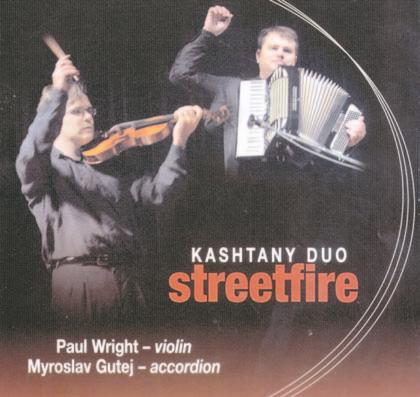
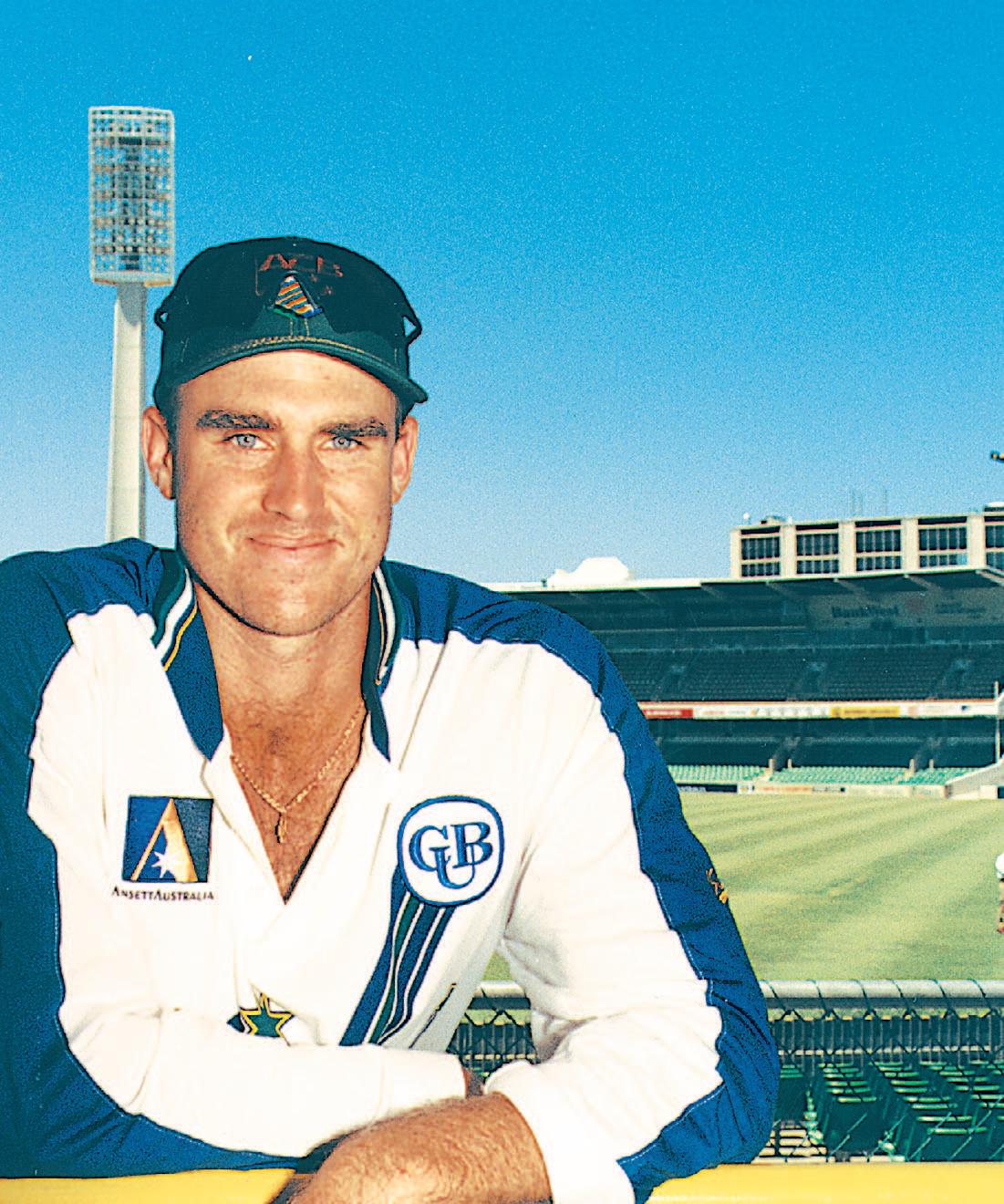
good I could become. Plus, there were a lot of external factors and I don’t know if I was mature enough to handle it.’
Starting out playing alongside legendary players such as Allan Border, David Boon and Steve Waugh is a big ask, Hayden explains: ‘You worry about what they’re thinking, what the commentators are thinking, what opposition sides are thinking.
‘I also had some great people I had to try and race for a spot all the time the Taylors and Slaters, who were fantastic players for Australia so it was pretty hard work.’
At times life is, he adds, not unlike cross-training up and down the sandhills near his ‘Straddie’
home.
‘If you look at the top you never seem to get there. Take one step at a time, put things in place, and before you know it you’re on top of the sandhill, wondering how you ever got there!
‘You feel that everything is against you when you’re not think-
than your immediate self, or the people around you. It gives you hope.
‘You see people turn to faith for a number of reasons, but I can’t think of a better reason than hope. There are times in life when you despair, and you need someone to challenge the way you think. You

was a real gutsy effort from him.’
Facing death makes you think about your life’s worth. Hayden says he believes in finding happiness in life, regardless of circumstances.
‘A mate of mine’s got a philosophy, "He who’s got the most toys wins". But I don’t need a lot of toys, to be honest. If I’ve got a surfboard and my family, I’m pretty happy—I find contentment.’
Hayden’s poise is not ‘bunged on’. For example, when I ask him how he rates being recently named Wisden’s cricketer of the year—the game’s highest accolade— his surprise is genuine.
‘I was told I was in the top-five cricketers of the year, but I’ve not yet been told that I’ve won it,’ he says, amused.
In a game obsessed with statistics, history and records, Hayden doesn’t know his batting average. (For the record, at the time of writing, Hayden’s Test batting average was 56.75 runs each time he went out to bat; second only to Adam Gilchrist among current players. Hayden’s one-day batting average was 42.21 runs.)
When grilled about it he laughs and replies, ‘Mate, I didn’t even know I was the cricketer of the year, I wouldn’t have a clue what my stats are.’ Hayden’s drive comes from within, rather than from the pressures around him. And one of the main engines driving this man is his sense of family.
We take a break mid-interview so Hayden can drive his parents down to the island’s barge. We later pause as Hayden the father takes precedence over Hayden the cricketer, cautioning his ‘darling’ Grace about ‘Daddy’s coffee mug’ and consoling the toddler when she bumps her nose.
ing well, but you reach a point where you really feel like things are aligning themselves in your favour.’
Hayden is, by his own account, uncomplicated. His pursuit of simplicity owes much to a childhood spent growing up on a peanut farm in Kingaroy, Queensland.
‘I was in Kingaroy for 16 years before I came down to Brisbane for boarding school,’ he says.
‘It was a great childhood; living in the country gives you an enormous freedom I think the space gave us the freedom to be who we were. I was driving a car at eight! I had a real affinity with the land, and you value your personal space a lot more in the country, as opposed to the city.’
Hayden also acknowledges his Christian upbringing as a formative influence a devout Catholic, church-going was a regular and important part of his family life.
‘Every weekend we’d go to Mass. Christianity gives you a great balance in your life and an awareness of something higher in life, rather
appreciate and respect something external to your family—there are a lot of qualities that come out of having a faith.
‘I’m glad I was brought up with a religious background I made choices along the way, some good, some bad, but I’ve always been able to find balance by my commitment to faith.’
That faith got a decent workout when Hayden’s boat was sunk miles from the shoreline on one fishing trip. With fellow cricketer Andrew Symonds and a mutual friend, Queensland Fishing Monthly’s Trent Butler, Hayden swam through big schools of pilchards—an open invitation to sharks. Built like a comic book superhero, Hayden’s been a strong swimmer all his life. Symonds is also a good swimmer but Butler, Hayden recalls, ‘was struggling a bit’. ‘We taught him how to swim sidestroke and we got him through that way. In the end we had to rescue him, drag him in through the last set of breakers. He wasn’t that fit, but it
I suggest fatherhood suits him; Hayden laughs and says, ‘I love it!’ His respect for family spreads beyond his own clan to the guys he spends his working life with— for Hayden, in a powerful sense, his fellow cricketers are family. In the hyper-competitive world of professional sports, that achievement is arguably as commendable as his batting.
‘I think people are fairly respectful of my faith,’ says Hayden. ‘I guess people have perceptions of you one way or another—some like you, some don’t—but I’m the sort of person that gives everyone a fair go and I don’t tend to polarise too many people.’ One of Hayden’s personal goals, alongside skipper Steve Waugh’s recent player conduct manifesto, is to ‘see that in the next few years this side gets recognised, and not only as one of the great cricketing sides to play for Australia’.
‘I’d also like us to confront headon some of the barriers that we’ve had, from a behavioural point of view. A lot of people say, the side’s "great but grumpy". We’ve actually been very proactive in trying to seek out ways that we can improve ourselves as people and as a side.
C o n t i n u e d p a g e 2 2
‘ T h e f a c t i s t h a t e v e r y o n e i n l i f e n e e d s c o m p a s s i o n a n d s u p p o r t Y o u c o m e a c r o s s c h o i c e s i n y o u r l i f e t h i n g s h a p p e n a n d a t t h e e n d o f t h e d a y i t s h o u l d n ’ t s t o p y o u f r o m g i v i n g s u p p o r t . KASHTANY DUO AS HEARD ON CLIVE ROBERTSON and DRIVE - ABC FM - Paul Wright (violin) - Myroslav Gutej (accordion) Part proceeds to CROSSROADS COMMUNITY and PREGANCY ASSISTANCE when purchased through their offices. For futher details Ph. 9446 8290 or go to:www.kashtanyduo.com VIRTUOSO GYPSY and WORLD MUSIC CD now available "It’s irresistibly foot-tapping music, presented with stylish conviction and a sizzling emotional temperature" Neville Cohen West Australian Newspaper "They have come up with a compilation that deserves a wide audience" Neville Cohen West Australian Newspaper The Record CHRISTMASEDITION 10 25 DECEMBER 2003

Don’t be just a Christmas Catholic
 By Paul Gray
By Paul Gray
“Do you come here often? ” It never was a great line for starting a new relationship, but at Christmas time, it has its uses.
People who don't come to church regularly, often make it at Christmas. This is extremely heartening for those who make it along to Mass most Sundays, barring sickness.
Nothing gladdens a Catholic heart like the sight of a full church. Standing-room only.
Kids everywhere, making noise while the priest does his thing up at the altar. It's a little like going to the football to see your favourite team playing at home.
The packed stands, the atmosphere of excitement. So much better than watching it on TV.
And so much better than just remembering what it was like, because you happened to go there once as a kid.
It isn't always like this, in church. In midwinter especially, when the Masses of the day can have boring titles like "15th Sunday in Ordinary Time, Year C," you can easily find yourself wondering: what is the point in continually going to church?
For the majority of Catholics – the ones who DON’T go to Mass every Sunday -churchgoing can seem a somewhat funny old practice.
A typical non-churchgoing Catholic, at least in my age-range, is someone who went to a Catholic school and had one or both parents who were regular Mass-goers themselves.

She or he probably did some sort of Religious Education at school. Memories of those "RE" classes would be vague – like the RE classes themselves, probably.
My only memory of RE classes from school were of making coloured art-works representing key words like "COMMUNITY." It was like kindergarten for teenagers.
"Don't give them anything intelligent to do during RE or it might strain their little brains" seemed to be the motto that my RE teachers cherished. They certainly didn't strain our brains.
Sadly, they didn't stimulate them, either, as far as knowledge or understanding of the Catholic faith was concerned.
I think that's one reason so many of my classmates from schooldays in the 1970s had stopped going to Mass regularly by about …. well, one year after leaving school.
Not that a typical Catholic's memories are all negative, by any means. Most of us cherish our early memories of going to Mass: the comforting, yet slightly mysterious rituals.
We cherish memories, too, of one or other Catholic parent, and their strong commitment to their faith. How it summed up, in a way, their strength of character, and that older, different world they came from.
Why, then, should anyone bother going to Mass more often?
My personal answer is that going to Mass gives us a connection to something that can't be connected to in any other way. It's the physical presence of God.
Frankly, that's such a radical proposition that to even talk about it openly is to invite suggestions that you're a looney, or a hippy.
Yet at the centre of the Mass is that mysterious ritual initiated by the historical Jesus in the episode known as the Last Supper. He commanded his followers to repeat the ritual, down through the ages, using the key words: "This IS my body."
Now you can accept or reject the notion that Jesus really was God. But if you accept it -- as many of humanity's greatest minds have done, through history – then these
words must mean something.
"This IS my body." Brought to life again, so to speak, under the veil of sacramental bread and wine. Brought to life again for you to eat.
This is the heart of the Mass. Why bother coming along for that?
I think the answer to that depends very much on where each of us is, individually, in our lives. For me, I've been "coming here" for years, and I don't find that Mass offers me much in the way of either social or emotional benefits.
But I'm not looking for social or emotional benefits, as it happens.
What I find Mass does offer is strong food for the mind. It's the continual challenge – an enjoyable one – of contemplating what God is like, why he made me, and those near and dear to me, and what it could be like to go beyond death and actually meet him "face to face," as the Bible puts it.
These are questions that lurk continually in the background of every adult mind, I suspect. When we come to Mass, and observe and listen, they're much more in the foreground.
And when we take Holy Communion –the Body of Jesus – there suddenly seems no need for questions at all. All the answers are there, inside you.
True, those answers still aren't entirely clear to the mind.
But there's a new and interesting connection that's formed, just for a time. It's a connection to a plainer understanding of what our lives mean. It's a personal connection to God himself.
I don't know if this makes me a better person. But I know it takes me somewhere that I can't get to any other way.
That makes it a journey well worth taking. Every week.
The Record CHRISTMASEDITION 25 DECEMBER 2003 11
o u a r e h e r e f o r a g o o d r e a s o n , s o w h y n o t e v e r y S u n d a y ?
Y
Will it take six strong men to bring you back to Church?
T h e r e are a n s w e r s t o y o u r q u e s t i o n s .
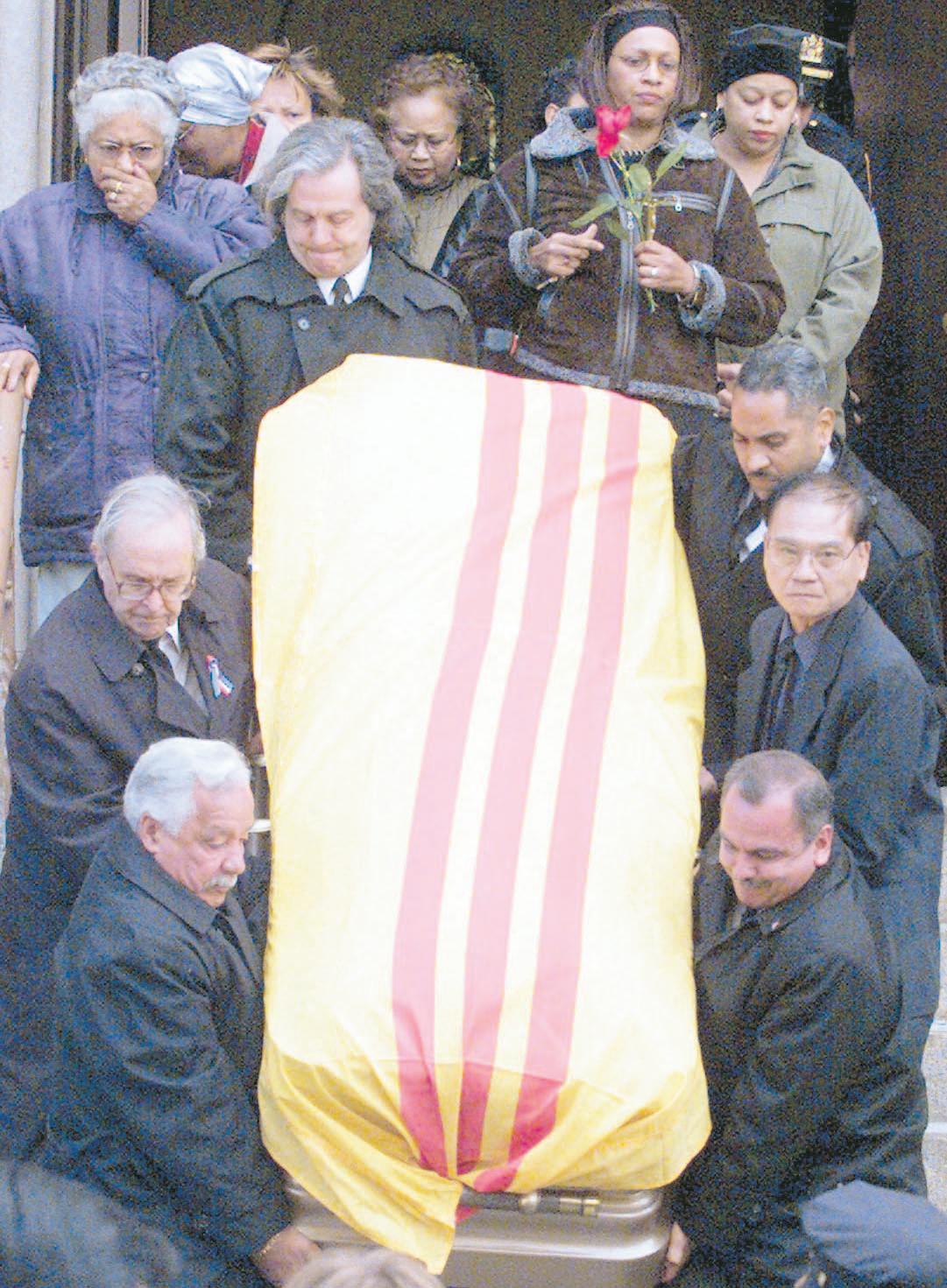
"Welcome! We miss you. Would you like to return to where you once belonged?" No matter how long you have been away from the Catholic Church, you can always come home again. You can start coming to Mass, become part of the parish community and enter into the faith far more deeply than when you left. A number of personal and life events typically facilitate the return of many inactive Catholics: the birth of a child, the death of a loved one, a serious illness or personal crisis, or simply the awareness of a need or void that cannot yet be named. Chances are that you are already feeling a strange inner pull or a spiritual longing that is God trying to draw you back to Himself. God never forces, though, God only invites. Whether or not you return to the Catholic Church is a decision that only you can make. How people leave the Catholic Church and how they make their way back is as varied and individual as they are. As many as half of those who return are self-initiated, most often beginning their journey by approaching a priest for the sacrament of Reconciliation. Many people want to come home to the Catholic Church but since no one ever asks them, they think they are not welcome. There are as many reasons for coming back to the Church as there are people who left. While God is at the centre of each person's decision to return, the circumstances are varied. Here are ten reasons that have influenced the decision of other people to return to the practice of the Catholic faith (Sunday Visitor)
■ Because they want meaning in life and the Catholic Church offers a beacon of light that gives meaning to our existence and leads to eternal life.
■ Because childhood memories surface and the Catholic Church offers both religious and mystical experiences that feed the heart, the mind, the body and the soul.
■ Because they made mistakes, they want complete assurance of God's forgiveness and the grace to start again and the Catholic Church offers absolution in the Sacrament of Reconciliation.
■ Because they need to forgive others and the Catholic Church provides the opportunity to seek God's help in forgiving others even when the other person does not ask for forgiveness or does not deserve it.
■ Because they want to be healed and there are people in the Church who can assist in the process of spiritual healing and help them get on with their life.
■ Because the Catholic Church has the fullness of truth and grace that has been guided and protected by the Holy Spirit for some two thousand years.
■ Because they want their children to have a faith foundation upon which to build their lives and the Catholic Church provides a firm moral foundation that goes beyond human logic and reasoning.
■ Because they want to be part of a faith community and a Catholic parish offers a sense of belonging, friendly people, good homilies, interesting activities, the Sacraments, a worship community in which to pray, celebrate joys, mourn losses, serve others, provide support and receive strength for daily life.
■ Because they want to help other people and the Catholic Church provides opportunities to touch the lives of people at home or around the world.
■ Because they hunger for the Eucharist--this is without exception the number one reason that people come back to the Catholic Church. Most people discover that coming back to the Church is not an event as much as it is a process that involves a little pain, a little laughter, some thinking, some prayer, some discernment and a lot of letting go.
What do they get in return? The Catholic Church offers union with Jesus Christ in scripture, in prayer, in the community of others, in the Eucharist, and in the other Sacraments. It offers spiritual support in good times and in bad. It offers divine wisdom that is thousands of years old. It offers meaning and purpose in this life and the promise of life after death.
You will know you are home again when you begin to feel a deep sense of peace.
YOURSAY
SOURCE:Information on this page was obtained from oncecatholic.org
M a r r a g e s s u e s
"After my marriage failed felt unsupported in so many ways—by my family, people at my parish, even some of my friends. I walked away from a Church which I felt didn’t care. When remarried, institutional religion really didn’t have much of a role in my life. But I still prayed, and I guess God answered my prayers with a loving, caring partner. We’ve both rediscovered our roots in the Church, and want to find our way back. But I’m afraid there are complications with the Church’s law that I don’t understand. Will it be embarrassing to my spouse and children? What do I have to do to get reconnected?"
N o F e d
"I grew up in the Church. As a child, I loved the stories about great figures of the Bible and about Jesus. As I grew older, I knew they were more than stories—they embodied a way of life. I gave myself to that way for a long time, but somehow, the communities I worshiped in never seemed to "grow up" with me. I felt treated like I was part of an assembly-line religion, a "fast-food" kind of faith. needed to be fed and nourished on "adult food," the tough and challenging message of the gospel. So I looked elsewhere. But I still miss something. Is that message being preached in the Church today?"
D t e d A w a y
"I don’t know how I left the Church. There wasn’t really any one reason. Life moved on, and so did I. Career, relationships, other concerns…perhaps no one noticed I was gone. And maybe I wished someone would have come looking for me. But lately, I feel Some One has—is it God’s Spirit within, calling me home? Where can I re-connect?"
Q u a e l w t h S t a
“They say the Church has a human face. Well, the last face I saw in the Church was all-too human! I don’t know if the person responsible for my ‘parting of the ways’ with the Catholic Church back then ever knew the damage that was done. The details of the incident are as fresh as yesterday. was insulted, hurt and left with a bitter taste each time I drove past my parish. It was a long, long time before I could even walk back into a Catholic Church—that’s how painful that experience was. But over time, I’ve begun to wonder: Should I let one person’s action exclude me from God’s gift of faith?"
F e t E x c u d e d
"For a long time I’ve felt had no place in the Church. And I’ve got a lot of company, it seems. Women, people of colour, gay and lesbian individuals, those of varying cultural groups—we’ve all experienced moments when the message of Christ came packaged in terms that excluded us. The very language from the pulpit betrayed a lack of sensitivity to issues and needs I struggle with. Policies and practices over history seem to have been labelled for someone other than me. Doesn’t anyone hear my voice?"
A b o t o n / p o s A b o r t o n
"I’m told I don’t belong. That message comes from both outside and inside of me. If there’s one clear thing hear from the Church these days, it’s that having an abortion makes me an outsider. But I want to attend to what I feel and to tell someone how I feel. Is there a place to begin healing without being judged?"
D c u l y W t h C h u c h T e a c h n g
"Some of the Church's teachings seem just plain wrong to me. How can I deny what is perfectly obvious to me just so that can toe the Church's party line? I could not respect myself if I said "yes" to what I see as false. Besides, a lot of things have changed over the years. Who is to say that the teaching I can't accept today won't change in the future? Why is the Catholic Church so inflexible?"
■ A Sense of Sexuality: Christian Love and Intimacy, Evelyn and James Whitehead, Crossroad, 1994.
■ Catechism of the Catholic Church, English translarion for Australia, 1994, St Paul’s/Libreria Editrice Vaticana.
■ Catholic Answers to Fundamentalists’ Questions, Philip St Romain, Liguori Publications, 1984.
■ Catholics Can Come Home Again: A Guide for the Journey of Reconciliation with Inactive Catholics by Carrie Kemp (Paulist 2001).
■ Catholics Coming Home: A Journey of Reconciliation: A
Beginning to answer your questions ...
Annulmen s seem fishy to me Isn’t t just a way o get money ou o d vorced people?
The increase in annulments granted by the Church is a source of confusion and sometimes anger for many Catholics, as well as some non-Catholics. Some wonder how could a marriage go on for years and still be sacramentally invalid.
Marriage is still considered permanent, and the indissolubility of sacramental marriage remains a central Catholic teaching. But the Church also is obliged to provide justice or anyone whose marriage has failed—when it can be shown with moral certainty that the marriage lacked from the beginning some essential element for a true, life-long bond. Pope Paul VI, in the 1960's, noted that delayed justice is injustice, and streamlined the annulment procedure. Some people say that you can buy an annulment in the Church. If that were true, which it is not, why would there be such an elaborate scheme to thwart any form of corruption? You would have to bribe at least six different Church court officials in two different dioceses and any one of them could throw the case out in a second. The American tribunal system operated $14,000,000 in the red in 1997. It is not now and never was a money-making proposition. It is a process that seeks to balance the needs of the hurting while preserving the sanctity of sacramental marriage.
Why wasn’ God there for me when I needed God?
Throughout history people have struggled to find meaning in their suffering. Sometimes this has led to cruel or unsatisfactory answers – such as, "You must have done something to deserve this," or, "God is testing you," or even worse, "What happened is really for the best, even if we can’t see it." While well-intentioned, answers such as these don’t begin to uncover the true causes of suffering.
Scripture suggests that our suffering comes from two basic causes: human choice and an imperfect world. In the Book of Genesis, Adam and Eve are given the awesome gift of freedom, but with that freedom comes the risk of making choices that hurt themselves and others. God, who created us in love, does not control our choices between good and evil. Often, suffering is the result of this freedom to choose. Natural disasters, such as earthquakes and floods, can be seen as the results of an unfinished and imperfect world, one that is still evolving.
Perhaps the greatest model for human suffering comes in the form of Jesus. He did not seek suffering – remember that he asked that "this cup" pass him by – but he was willing to endure it as the price of being a loving person in an unjust world. And Jesus’ suffering is redemptive: He never talks about his death without adding that he will rise again three days later. Like Jesus, we can see our trials as redemptive, bringing forth goodness and new life for ourselves and others.
Nothing answers our questions about suffering as well as the example Jesus lived. Look for the image of this lived example in the crucifix. And be consoled that the question of suffering was not an easy one for Jesus, either.
Why don t women have he same opportuni es in the Church as men do?
Long before women in most countries (including Australia) could vote or work outside the home, Catholic women were running hospitals, schools, orphanages and other social institutions. Women such as Elizabeth Ann Seton, Rose Philippine Duchesne and Frances Xavier Cabrini were canonised after dedicating their lives to serving the needy.
The tradition of female leadership in the Church continues today, not only in the form of university presidents and hospital administrators, but also in parish managers, sacristans and directors of religious education.
Girls assist with the Mass as altar servers alongside boys. As for ordination, it does remain reserved for men.
Handbook for Churches Reaching Out to Inactive Catholics by Carrie Kemp and Donald Pologruto (Harper).
■ Good News for Alienated Catholics: With Reflection Questions for Teachers and Preachers by Father Henry Fehren (Resource).
■ Handbook for Today Catholics. A Redemptorist Pastoral Publication (also available in Spanish), Liguori Publication. 1994.
■ Marriage, Divorce & Nullity: A Guide to the Annulment Process in the Catholic Church, Geoffrey Robinson, Novalis/The Liturgical Press, 1984.
■ The Essential Catholic Handbook, A Summary of Beliefs, Practices and Prayers, A Redemptorist Pastorala Publication, Liguori Publications, 1997.
Pope John Paul II believes that it was determined by Christ himself that only males be ordained to the priesthood and that he, John Paul, has no power to deviate from what Jesus has determined. But this does not prevent women from serving the Church in an otherwise limitless number of ways. The Church needs leaders – women and men – willing to give their time and talents.
Why is the Church so imperfect?
Abishop writes, "It's easy to love a Church that's perfect—if you find it. But to love the Church with its warts means you have accepted Christ's risk, to hand that Church over to human beings. Because Christ made that risk, you and I are in trouble. Because it means that all of our defects are going to be as widely visible as our assets. That's the way it is.
"Each of us must come to terms with living in a Church where the dance of God often happens among so many human tunes that it's hard to see the divine element dancing with us. When we can't accept Jesus' Church with its human face, we send a mixed, self-defeating signal to the younger generation.
"I had a wonderful Irish grandma who knew no theology. She could never distinguish between virgin birth and Immaculate Conception and I gave up trying to explain it to her! I also had an uncle who refused to go to church. remember her saying to him, ‘Yes, you don't like Father Bertrand so you don't go to church. You don't like the bartender either, but you go for a whiskey when you want one!’
"We dance with everybody. That's my new definition of Church. Every Sunday Catholics all over the world say, ‘I believe in one holy catholic and apostolic Church.’ Perhaps it’s time to ask yourself, ‘How am I going to be a part of it? How can I begin to make it easier for people to believe because of the goodness of my life, because of my becoming more and more like Jesus Christ? How can break down all those barriers that divide us so that we can dance together?’ That's being truly Catholic."
I m th nking of returning to the Church but m not sure where to beg n Can you help?
We’re glad to hear that you’re thinking of coming home to the Catholic Church. There are many ways to reacquaint yourself with Catholicism and with the changes the Church has undergone in recent years. It all depends on how you prefer to begin.
If you want to learn with others, an excellent way to begin is to go through your parish’s RCIA (Rite of Christian Initiation of Adults) process. You may find you’re not the only returning Catholic who feels lost, and you will also meet and learn from new Catholics.
Contact the pastor, pastoral associate, deacon or director of religious education (DRE) at your local parish for more information. A full list of all Catholic parishes is found in the White Pages.
If you prefer to do some reading on your own at first, there are several books that may be helpful. Faith Rediscovered: Coming Home to Catholicism, by Lawrence S. Cunningham (Paulist Press), has an appendix listing basic readings. Another is While You Were Gone: A Handbook for Returning Catholics, by William J. Bausch (Twenty-Third Publications).
Another book from Paulist Press, by John J. Kenny, is Now That You Are a Catholic: An Informal Guide to Catholic Customs, Traditions and Practices. (You can order these books in any bookstore or online bookseller.) We also recommend Archbishop Daniel E. Pilarczyk's book, Practicing Catholic (St. Anthony Messenger Press).
Another excellent resource is the website www.oncecatholic.org (where this information comes from) and www.AmericanCatholic.org You can use the conversation corners (message boards) on this site to ask specific questions or seek general guidance. CONTINUED OVER
■ Vatican Council II: The Conciliar and Post Conciliar Documents, Austin Flannery, a.p., Costello Publishing Company, Northport, NY, 1992.
And available from The Record:
Contact us on (08) 9227 7080
■ Arise from Darkness:What to do when life doesn’t make sense, by Fr Benedict Groeschel, $20
■ Beyond Gay, by David Morrison, introduction by Archbishop Carles Chaput $20
■ Good News About Sex and Marriage, Answers to your honest questions about Catholic teaching, by Christopher West, $20
Q&
H e p f u R e a d n g o h o s e c o n s d e r n g e t u r n n g o h e C a h o l c C h u c h i n c u d e
A
The Record CHRISTMASEDITION 12 25 DECEMBER 2003 The Record CHRISTMASEDITION 25 DECEMBER 2003 13
YOURSAY
Beginning to answer your questions ... SOURCE:Information
M a r r i a g e I s s u e s
"After my marriage failed I felt unsupported in so many ways—by my family, people at my parish, even some of my friends. I walked away from a Church which I felt didn’t care. When I remarried, institutional religion really didn’t have much of a role in my life. But I still prayed, and I guess God answered my prayers with a loving, caring partner. We’ve both rediscovered our roots in the Church, and want to find our way back. But I’m afraid there are complications with the Church’s law that I don’t understand. Will it be embarrassing to my spouse and children? What do I have to do to get reconnected?"
N o t F e d
"I grew up in the Church. As a child, I loved the stories about great figures of the Bible and about Jesus. As I grew older, I knew they were more than stories—they embodied a way of life. I gave myself to that way for a long time, but somehow, the communities I worshiped in never seemed to "grow up" with me. I felt treated like I was part of an assembly-line religion, a "fast-food" kind of faith. I needed to be fed and nourished on "adult food," the tough and challenging message of the gospel. So I looked elsewhere. But I still miss something. Is that message being preached in the Church today?"
D r i f t e d A w a y
"I don’t know how I left the Church. There wasn’t really any one reason. Life moved on, and so did I. Career, relationships, other concerns…perhaps no one noticed I was gone. And maybe I wished someone would have come looking for me. But lately, I feel Some One has—is it God’s Spirit within, calling me home? Where can I re-connect?"
Q u a r r e l w i t h S t a f f
“They say the Church has a human face. Well, the last face I saw in the Church was all-too human! I don’t know if the person responsible for my ‘parting of the ways’ with the Catholic Church back then ever knew the damage that was done. The details of the incident are as fresh as yesterday. I was insulted, hurt and left with a bitter taste each time I drove past my parish. It was a long, long time before I could even walk back into a Catholic Church—that’s how painful that experience was. But over time, I’ve begun to wonder: Should I let one person’s action exclude me from God’s gift of faith?"
F e l t E x c l u d e d
"For a long time I’ve felt I had no place in the Church. And I’ve got a lot of company, it seems. Women, people of colour, gay and lesbian individuals, those of varying cultural groups—we’ve all experienced moments when the message of Christ came packaged in terms that excluded us. The very language from the pulpit betrayed a lack of sensitivity to issues and needs I struggle with. Policies and practices over history seem to have been labelled for someone other than me. Doesn’t anyone hear my voice?"
A b o r t i o n / p o s t A b o r t i o n
"I’m told I don’t belong. That message comes from both outside and inside of me. If there’s one clear thing I hear from the Church these days, it’s that having an abortion makes me an outsider. But I want to attend to what I feel and to tell someone how I feel. Is there a place to begin healing without being judged?"
D i f f i c u l t y W i t h C h u r c h T e a c h i n g
"Some of the Church's teachings seem just plain wrong to me. How can I deny what is perfectly obvious to me just so that I can toe the Church's party line? I could not respect myself if I said "yes" to what I see as false. Besides, a lot of things have changed over the years. Who is to say that the teaching I can't accept today won't change in the future? Why is the Catholic Church so inflexible?"
■ A Sense of Sexuality: Christian Love and Intimacy, Evelyn and James Whitehead, Crossroad, 1994.
■ Catechism of the Catholic Church, English translarion for Australia, 1994, St Paul’s/Libreria Editrice Vaticana.
■ Catholic Answers to Fundamentalists’ Questions, Philip St Romain, Liguori Publications, 1984.
■ Catholics Can Come Home Again: A Guide for the Journey of Reconciliation with Inactive Catholics by Carrie Kemp (Paulist 2001).
■ Catholics Coming Home: A Journey of Reconciliation: A
Annulments seem fishy to me Isn’t it just a way to get money out of divorced people?
The increase in annulments granted by the Church is a source of confusion and sometimes anger for many Catholics, as well as some non-Catholics. Some wonder how could a marriage go on for years and still be sacramentally invalid.
Marriage is still considered permanent, and the indissolubility of sacramental marriage remains a central Catholic teaching. But the Church also is obliged to provide justice for anyone whose marriage has failed—when it can be shown with moral certainty that the marriage lacked from the beginning some essential element for a true, life-long bond. Pope Paul VI, in the 1960's, noted that delayed justice is injustice, and streamlined the annulment procedure.
Some people say that you can buy an annulment in the Church. If that were true, which it is not, why would there be such an elaborate scheme to thwart any form of corruption? You would have to bribe at least six different Church court officials in two different dioceses and any one of them could throw the case out in a second. The American tribunal system operated $14,000,000 in the red in 1997. It is not now and never was a money-making proposition. It is a process that seeks to balance the needs of the hurting while preserving the sanctity of sacramental marriage.
Why wasn’t God there for me when I needed God?
Throughout history people have struggled to find meaning in their suffering. Sometimes this has led to cruel or unsatisfactory answers – such as, "You must have done something to deserve this," or, "God is testing you," or even worse, "What happened is really for the best, even if we can’t see it." While well-intentioned, answers such as these don’t begin to uncover the true causes of suffering.
Scripture suggests that our suffering comes from two basic causes: human choice and an imperfect world. In the Book of Genesis, Adam and Eve are given the awesome gift of freedom, but with that freedom comes the risk of making choices that hurt themselves and others. God, who created us in love, does not control our choices between good and evil. Often, suffering is the result of this freedom to choose. Natural disasters, such as earthquakes and floods, can be seen as the results of an unfinished and imperfect world, one that is still evolving.
Perhaps the greatest model for human suffering comes in the form of Jesus. He did not seek suffering – remember that he asked that "this cup" pass him by – but he was willing to endure it as the price of being a loving person in an unjust world. And Jesus’ suffering is redemptive: He never talks about his death without adding that he will rise again three days later. Like Jesus, we can see our trials as redemptive, bringing forth goodness and new life for ourselves and others.
Nothing answers our questions about suffering as well as the example Jesus lived. Look for the image of this lived example in the crucifix. And be consoled that the question of suffering was not an easy one for Jesus, either.
Why don’t women have the same opportunities in the Church as men do?
Long before women in most countries (including Australia) could vote or work outside the home, Catholic women were running hospitals, schools, orphanages and other social institutions. Women such as Elizabeth Ann Seton, Rose Philippine Duchesne and Frances Xavier Cabrini were canonised after dedicating their lives to serving the needy.
The tradition of female leadership in the Church continues today, not only in the form of university presidents and hospital administrators, but also in parish managers, sacristans and directors of religious education.
Girls assist with the Mass as altar servers alongside boys. As for ordination, it does remain reserved for men.
Handbook for Churches Reaching Out to Inactive Catholics by Carrie Kemp and Donald Pologruto (Harper).
■ Good News for Alienated Catholics: With Reflection Questions for Teachers and Preachers by Father Henry Fehren (Resource).
■ Handbook for Today Catholics. A Redemptorist Pastoral Publication (also available in Spanish), Liguori Publication. 1994.
■ Marriage, Divorce & Nullity: A Guide to the Annulment Process in the Catholic Church, Geoffrey Robinson, Novalis/The Liturgical Press, 1984.
■ The Essential Catholic Handbook, A Summary of Beliefs, Practices and Prayers, A Redemptorist Pastorala Publication, Liguori Publications, 1997.
Pope John Paul II believes that it was determined by Christ himself that only males be ordained to the priesthood and that he, John Paul, has no power to deviate from what Jesus has determined. But this does not prevent women from serving the Church in an otherwise limitless number of ways. The Church needs leaders – women and men – willing to give their time and talents.
Why is the Church so imperfect?
Abishop writes, "It's easy to love a Church that's perfect—if you find it. But to love the Church with its warts means you have accepted Christ's risk, to hand that Church over to human beings. Because Christ made that risk, you and I are in trouble. Because it means that all of our defects are going to be as widely visible as our assets. That's the way it is.
"Each of us must come to terms with living in a Church where the dance of God often happens among so many human tunes that it's hard to see the divine element dancing with us. When we can't accept Jesus' Church with its human face, we send a mixed, self-defeating signal to the younger generation.
"I had a wonderful Irish grandma who knew no theology. She could never distinguish between virgin birth and Immaculate Conception and I gave up trying to explain it to her! I also had an uncle who refused to go to church. I remember her saying to him, ‘Yes, you don't like Father Bertrand so you don't go to church. You don't like the bartender either, but you go for a whiskey when you want one!’
"We dance with everybody. That's my new definition of Church. Every Sunday Catholics all over the world say, ‘I believe in one holy catholic and apostolic Church.’ Perhaps it’s time to ask yourself, ‘How am I going to be a part of it? How can I begin to make it easier for people to believe because of the goodness of my life, because of my becoming more and more like Jesus Christ? How can I break down all those barriers that divide us so that we can dance together?’ That's being truly Catholic."
I’m thinking of returning to the Church but I’m not sure where to begin Can you help?
We’re glad to hear that you’re thinking of coming home to the Catholic Church. There are many ways to reacquaint yourself with Catholicism and with the changes the Church has undergone in recent years. It all depends on how you prefer to begin.
If you want to learn with others, an excellent way to begin is to go through your parish’s RCIA (Rite of Christian Initiation of Adults) process. You may find you’re not the only returning Catholic who feels lost, and you will also meet and learn from new Catholics.
Contact the pastor, pastoral associate, deacon or director of religious education (DRE) at your local parish for more information. A full list of all Catholic parishes is found in the White Pages.
If you prefer to do some reading on your own at first, there are several books that may be helpful. Faith Rediscovered: Coming Home to Catholicism, by Lawrence S. Cunningham (Paulist Press), has an appendix listing basic readings. Another is While You Were Gone: A Handbook for Returning Catholics, by William J. Bausch (Twenty-Third Publications).
Another book from Paulist Press, by John J. Kenny, is Now That You Are a Catholic: An Informal Guide to Catholic Customs, Traditions and Practices. (You can order these books in any bookstore or online bookseller.) We also recommend Archbishop Daniel E. Pilarczyk's book, Practicing Catholic (St. Anthony Messenger Press).
Another excellent resource is the website www.oncecatholic.org (where this information comes from) and www.AmericanCatholic.org. You can use the conversation corners (message boards) on this site to ask specific questions or seek general guidance.
■ Vatican Council II: The Conciliar and Post Conciliar Documents, Austin Flannery, a.p., Costello Publishing Company, Northport, NY, 1992.
And available from The Record:
Contact us on (08) 9227 7080
■ Arise from Darkness:What to do when life doesn’t make sense, by Fr Benedict Groeschel, $20
■ Beyond Gay, by David Morrison, introduction by Archbishop Carles Chaput $20
■ Good News About Sex and Marriage, Answers to your honest questions about Catholic teaching, by Christopher West, $20
H e l p f u l R e a d i n g f o r t h o s e c o n s i d e r i n g r e t u r n i n g t o t h e C a t h o l i c C h u r c h i n c l u d e :
Q& A
The Record CHRISTMASEDITION 25 DECEMBER 2003 13
on this page was obtained from oncecatholic.org
A SHORTSTORYBYTONYEVANS Fora special occasion
The first time I saw the Christmas pudding on the top shelf of the larder in my mother’s flat I was so surprised I dropped the plate I was wiping.
My mother at the sink, her hands in the washing-up water, sighed as I gathered up the pieces, "Never mind dear" she said sweetly, "it was a cheap one from Woolworths". I mumbled an apology and when the pieces were safely in the bin I remembered what had made me drop the plate. I looked up at the top shelf again.
"I see you did not eat your Christmas pudding, Mother," I said. There was disappointment in my voice and accusation too. You see I had ordered the pudding as a present for my mother sent from Australia six months previously.
In those days, long before shopping became possible via Email I had solved the problem of finding something suitable for my mother by ordering a gift through a department store at home that had links with a similar store in England. The coloured picture on the brochure advertising the service showed a friendly English postman handing an unexpected parcel to an aged couple at the door of their cottage. This encouraged me to believe that my mother would receive the gift with similar pleasure.
She had long ago given up making Christmas puddings, or indeed any of the tempting dishes that she once provided for her three sons. To see the gift unappreciated and tucked away where it might remain unnoticed was not only shocking but hurtful.
My mother turned her head towards me from the sink where she was emptying the washing up bowl. She never allowed me to wash up. She had been independent all her life, and now, even in old age, she rejected offers of assistance in the belief that she could manage successfully as she had always done.
"The pudding? Oh, it was a little too much for one person dear". She dried her hands on her apron and added knowingly. "I am saving it for a special occasion."
My mother never suffered embarrassment like other people when asked an awkward question. Her explanations were final; she did not expect to be questioned further.
I looked again at the top shelf. The pudding in its Christmassy box didn’t seem large, sufficient, perhaps, for a family of four. But from long experience I knew it was useless to argue. I accepted my mother’s explanation and we returned to her cosy sitting room.
I forgot about the pudding until dinner on the following Sunday. (Ever since I was a child dinner had been served in the middle of the day on Sundays after we had all returned from late Mass).

That Sunday was no exception and indeed, was something of a family celebration, not only in honour of my brief visit from Australia, but coincidentally it was the thirtieth anniversary of my elder brother’s wedding. My younger brother joined us and so we were six around the table.
My mother had started preparing the meal long before we went to Mass and returned to the kitchen afterwards exhibit-
CHRISTMAS PUDDING
History
It originated as a 14th century "porridge" called frumenty that was made by boiling beef and mutton with raisins, currants, prunes, wines and spices. This would often be more like soup and was eaten as a fasting dish in preparation for the Christmas activities.
By 1595 frumenty was evolving into plum pudding, having been thickened with eggs,breadcrumbs,dried fruit and given more flavour thanks to the addition of ale and spirits.
In 1664 the pudding was banned by the Puritans describing it as a lewd custom and its rich ingredients as unfit for Godfearing people.
In 1714 George 1 re-established it as part of the Christmas feast.

By Victorian times Christmas puddings had evolved into something which looked similar to the ones enjoyed today.
Customs
Over the years many customs have surrounded this popular festive dessert. It is said puddings should be made by the 25th Sunday after Trinity, prepared with 13 ingredients to represent Christ and His Disciples and that every member of the family take turns to stir the pudding with a wooden spoon from east to west in honour of the Three Kings.
ing some of her old culinary enthusiasm. An hour later she presented us with roast chicken with home-made stuffing, baked potatoes with that crisp brown edging that I remembered as a child, and fresh garden peas and carrots.
The sweet course was less successful. I noted the piecrust was burnt around the edges and was embarrassingly thick, too hard and tasteless. The gooseberries in the pie, which mother knew I relished and which were bought especially for me, were sour, pale and mushy. The watery custard bore evidence of the reconstituted powder from which it had been made.
Wistfully I thought of the Christmas pudding in the larder. Surely this would have been the special occasion that my mother had been waiting for? But I kept silent and gallantly asked for a second helping of gooseberry pie.
When next I visited my mother in England two years later – two days squeezed in between business appointments in London – I was able to comfort her after the death of a close friend and neighbour. Gerald, my younger brother, home from Nigeria, joined us for lunch. Poor mother had aged to an extent that surprised us. Her hair was thin and grey, her shoulders were more stooped than I remember, her face sallow and heavily lined.
Her arthritic hands placed an apple pie on the table so unsteadily that a glass was knocked over and shattered. I couldn’t resist saying: "You shouldn’t have bothered making pastry, Mother," and added with a barely concealed smile, "We could have had that old Christmas pudding. Much easier for you."
"Nonsense" she replied, "It’s no great effort to make pastry. I have made enough pies in my time. I’ve told you before, I am keeping your Christmas pudding for a special occasion."
By then the Christmas pudding had become a family joke.
That was the last time I visited my mother. It was a sad occasion and I think she knew I would not see her again. She sat in her chair by the window, peering through the glass, unseeing, and yet waving as I disappeared down the road on my way to Heathrow.
The following New Year I was back in England again just in time for the funeral. The Mass and burial were not the emotional hurdle I had dreaded. The young priest was businesslike and cheerful and spoke of my mother’s long and saintly life; and of her devotion to parish work. We sang two of her favourite hymns and I read a passage from the twenty-first chapter of Proverbs extolling the virtue of a good wife and mother. "She stretches out her hand to the poor; yea, she reaches forth her hands to the needy."
There were smiles and handshakes as we
The Record CHRISTMASEDITION 14 25 DECEMBER 2003

gathered outside the church afterwards, and I was aware of snatches of conversation: "Fancy! A widow for thirty years!" said one. And another, "She had a long life." And yet another, "Ninety-six was a great age". A friend of my mother’s, nearly the same age but crippled with arthritis, patted me on the hand in sympathy and whispered: "Your mother was fortunate, she suffered no pain at the end."
This was all true. My mother had never had a serious illness in her life and had simply died of old age.
The good spirits displayed on the frosty morning of the funeral were not in evidence the next day. January weather in England is at its most inhospitable. A light fall of snow decorated the ground. My two brothers and I had agreed to meet in my mother’s flat and perform the melancholy task of packing up and dispersing her few remaining possessions. There was little left of value; the furniture, though solid, was shabby and unfashionable.
The two best pieces, a roll-top desk and old oak dresser bore evidence of woodworm. What little she had once possessed with pride - mainly cut glass, silver and china - she had already divided among us. Being a practical woman my mother had given away many of her clothes and ornaments to charity shops which were numerous in the seaside town favoured by the elderly.
As soon as we entered the flat my younger brother, the practical one of the three, set about taking pictures off the wall, and shifting furniture so that the old carpets, past rescuing, could be rolled up and taken to the dump. ‘No point in being sentimental about this’, he said.
At first I hung back, reluctant to disturb those things that spoke so clearly of my mother’s existence. Illogically I allowed myself to dream that while these remained in place as they were while my mother was alive, perhaps the owner might yet return. I wandered into the silent kitchen to be by myself. The pots and pans and the old gas cooker were precisely as my mother had left them. Her apron hung on the back of the door.
The washing-up bowl, so carefully placed by the tap, was ready for use after the next meal. The appointments calendar hung over the breakfast table - one of those ubiquitous free ones over-printed with an advertisement for a retailer, in this case a local chemist. My mother had scribbled her next hair appointment that week and, later in the month, the day her next pension cheque was due. The sense of my mother’s presence was irresistible.
For a moment my eyes rested on the chair by the window, the one draped with her loose knitted cover where she used to sit and scan the street for the postman who sometimes - but perhaps not often enoughbrought my letters from Australia.
I opened the larder door and peered at the clutter of jars, pickles, tins and condiments. My mother always kept a stock of tinned goods and baking requirements although she ate very sparingly, and many of the items remaining had been bought months, perhaps years before. She claimed that she
"
had stocks in reserve in case she was prevented by illness or the weather from getting to the shops.
As my eyes got used to the dim light I saw, on the very top shelf in the corner, the Christmas pudding. The original decorated cardboard box was strangely familiar, an old friend.
"What are you doing in there, by yourself? Not getting all morbid, I hope?" Gerry’s wife, a large woman clothed in a voluminous raincoat, burst into the kitchen. I smiled back at her and made some excuse for being there.
"Go and help your brothers", she said imperiously, taking off her coat, "Ï am going to make the workers some lunch."
It didn’t do to argue with Christine.
I said as I left her, "You will find a selection of things to eat in the larder, but take care, most of them are long past their use by date."
The rest of the morning passed more cheerfully than could be expected under the circumstances. The three of us worked well together, reminiscing, often joking as we packed books and records into boxes, determining which items might be saved, and which should go the way of my mother’s clothes - to op-shops.
My elder brother, appointed executor, took charge of sorting papers in the desk. He would occasionally call us over to look at documents and letters he had found there. There didn’t appear to be much of interest until he cried out, "Good God, look at this!"
"What is it?" I asked.
"A Will, our mother’s Will." He said. "it’s handwritten, a solicitor might regard it a bit eccentric, but I have no doubt it’s valid".
"What do you mean, eccentric, George?"
Before he could answer Christine called from the kitchen that lunch was ready and that we had better come and get it, or it would get cold.
"Bring the Will with you," I said. "You can read it to us while we eat."
We squeezed around the small table under the chemist’s calendar. Christine had already placed a casserole there, and a dish of peas. "Macaroni cheese", she said briskly. "Ï didn’t have much choice. The packet of macaroni looked as though it had been there for months, the cheese was old, but not walking."
Anything would have tasted good after our morning of furniture moving and rolling up carpets but Christine was a resourceful cook. We enjoyed the dish and enjoyed, too, being together again after several years absence.
When we had demolished the casserole I said, "Back to the Will, George. What’s eccentric about it?"
"The language is, well, unlike a legal document, very chatty and quaintly naïve. In essence she wants her modest savings to be divided equally between us three; but then she lists a number of personal items to be distributed to individuals - her nieces and nephews and one or two close friends."
""Poor mother! Delusions of grandeur!" interposed Gerry "She’s read too many novels in which the family is gathered in the ancestral home listening to the solicitor reading the will."
George turned the page of the will slowly and adjusted his reading glasses. "They are hardly the crown jewels." He quipped grimly.
"Her ancient record-player goes to you, Gerald. Her collection of romantic novels goes to my two girls; those two cheap prints in the sitting room go to you Christine probably because she remembers you paint. There are one or two other things,
MORE Q & A
I had an abortion. Does that mean I’m excommunicated, or can I return to the Church?
No matter what has happened, you can always come back to the Church. God’s mercy and forgiveness knows no bounds. While it is true that the Catechism teaches that the act of procuring an abortion has the penalty of excommunication attached to it, the Church also has extensive teachings and programs designed to help women (and men) heal after abortions.
The Catholic Church is the only denomination in the world that has a special ministry for those who have had abortions. There are specially trained clergy and therapists who can assist anyone seeking help. The Holy Father in the Section 99 of the Gospel of Life, tells women who have had abortions that there is hope and that the Father of Mercies is waiting to pour out forgiveness and healing if they come with a repentant heart. Furthermore, there are strict conditions governing whether one has actually incurred excommunication. The penalty--if it is incurred--can be removed.
The American National Office of Post-Abortion Reconciliation & Healing has an internet site which may be helpful at www.marquette.edu/rachel. Here in Perth you can contact Pregnancy Assistance on 9328 2929 or any Catholic priest
Why is the Church opposed to birth control?
similarly of little value." George paused and frowned as he studied the final page.
"Well, let’s have it then," said Gerry impatiently. "The suspense is killing us."
"There’s one final item on the list." George read slowly: "To my three sons the Christmas pudding in the larder only to be eaten on a special occasion."
The three of us looked across at each other, struck silent for an instant, and then, as if on cue, bellowed with laughter.
Only Christine remained silent and ashenfaced. When the three of us had calmed down sufficiently to notice her reaction and her obvious distress, George asked herwhile still suppressing the urge to laugh:
"What’s wrong, Christine? You have to admit that Mother had a sense of humour, surely? This must rank as the craziest bequest ever – a Christmas pudding? The very pudding that Jim gave her as a present years ago."
At this we all started laughing again much to Christine’s displeasure. She remained stony-faced. She got up from the table slowly and, crossing to the stove, opened the oven door while we continued laughing.
Because we were laughing so much we didn’t see what Christine was bringing out of the oven but as she approached the table with the succulent dark brown, domeshaped mound on a platter, our laughing ceased abruptly in hushed appreciation.
The Church’s teaching on artificial contraception is only one part of its understanding of human sexuality. This teaching sees sexuality as both a wonderful gift and an awesome responsibility, a precious part of God’s plan that has potential for great abuse. Because sexual intercourse is designed to unite two people in an act of vulnerability and intimacy, it is reserved for married couples. And because God shares with us the ability to create life through lovemaking, it is imbued with special responsibilities, one of which is to be open to the procreative possibility of intercourse.
This teaching sees sexuality as both a wonderful gift and an awesome responsibility, a precious part of God’s plan that has potential for great abuse.
The Church, however, has become more sensitive in recent decades to the needs of married couples to responsibly space the births of their children.
Catholic teaching requires that this spacing occur naturally, using the biological ebb and flow of the woman’s fertility cycle. Natural family planning is not only a way to avoid or achieve pregnancy; it is also a way for couples to become closer through the shared task of charting fertile and infertile periods. Many couples report a greater knowledge of each other and a greater respect for God’s plan after practising natural family planning.
The Record CHRISTMASEDITION 25 DECEMBER 2003 15
"It was the only thing I could find for a second course" she whimpered apologetically. "I only hope your Mother would agree that this is, well, a special occasion." T h e p u d d i n g ? O h , i t w a s a l i t t l e t o o m u c h f o r o n e p e r s o n d e a r " . S h e d r i e d h e r h a n d s o n h e r a p r o n a n d a d d e d k n o w i n g l y . " I a m s a v i n g i t f o r a s p e c i a l o c c a s i o n "

The one to rule them all
The essential guide to the “Return of the King” released nationally tomorrow
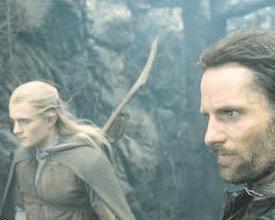 R E V I E W
By David DiCerto, CNS
R E V I E W
By David DiCerto, CNS
C.S. Lewis once remarked that after someone has read "The Lord of the Rings," they are "never quite the same." The same can be said of anyone viewing director Peter Jackson's lavishly shot film version of J.R.R Tolkien's epic fantasy set in the mythic realm of Middleearth.
After 19 Oscar nominations and nearly seven hours of pure movie magic, the king returns in the much-anticipated "The Return of the King," the third and final chapter in the Tolkien trilogy.
And though the three films' collective price tag of $300 million is downright Hobbit-sized compared to their projected worldwide gross ($1.8 billion and climbing), Jackson has much more riding on the third installment than just money.
The real validation will come from the legions of devoted Tolkien enthusiasts for whom "The Lord of the Rings" represents more than good storytelling; for them it is, as Lewis asserted, a life-changing experience.

Fellowship of the Ring" (2001) and "The Two Towers" (2002), have won him both critical and fan praise, anything short of an expectation-exceeding closing act would mean that Jackson and his filmic fellowship have failed in their quest to translate Tolkien's Homeric opus to the big screen.
Middle-earthers, fear not. "The Return of the King" not only eclipses its predecessors in scope but weaves their disparate narra-
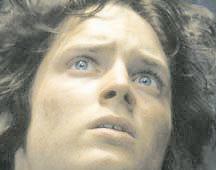
set for the climactic confrontation between the forces of good and evil, bringing to completion the quest of humble hobbit Frodo Baggins (Elijah Wood) as he journeys with his stalwart friend, Sam (Sean Astin), to Mount Doom in order to destroy the One Ring, a talisman of seductive power coveted by the dark lord Sauron which he would wield to subjugate all of Middle-earth.
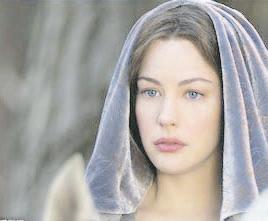

And while his first two efforts, "The
tive threads into a cohesive and emotionally satisfying conclusion, resulting in a work both grander in scale and deeper in human drama than the two previous films (a hat trick never scored by even such hallowed Hollywood trifectas as the "Godfather" and "Star Wars" trilogies -- not to mention the overhyped, cyber-mess "Matrix" sequels).
In "The Return of the King," the stage is
Along the way, their loyalties are tested by the Ring's poisonous influence -- as well as by the presence of their Iago-like guide, Gollum (voiced by Andy Serkis), a pathetic, mercurial creature whose will has been irrevocably perverted by the baneful band. Meanwhile, their comrades in arms, led by the wise wizard Gandalf (Ian McKellen) and the noble though reluctant warriorking Aragorn (Viggo Mortensen), try to buy
them time by leading a last-stand resistance against Sauron's hordes, who are hell-bent - as well as hell-sent - on the genocidal annihilation of mankind. Like the Halflings, they must also contend with obstacles within their own camp in the person of Denethor (John Noble), a Learish royal steward whose filial favouritism lends some Shakespearean shading to the picture.
Like the two earlier installments, "The Return of the King" is rich in Christian symbolism and touches on transcendent themes such as mortality, free will and divine providence - though, as in the books, much of the religiosity is implicit rather than explicit.
An intensely devout Catholic, Tolkien drew from a variety of inspirations, including Judeo-Christian scriptures, classical and Celtic mythology and Norse sagas to craft a timeless, elemental story that gives voice to the wider spiritual realty behind ordinary life.
And while it can be seen as a cautionary tale about the corrupting consequences of absolute power, it is at its heart a tale about hope. Echoing Christ's passion, Frodo and Sam's Via Dolorosa reminds us that, through self-sacrifice, "good" will ultimate-
The Record CHRISTMASEDITION
T h o u g h m u c h m o r e t h a n m e r e e s c a p i s t f a r e , t h e f i l m ' s c e n t r e p i e c e i s t h e e p i c B a t t l e o f P e l e n n o r F i e l d , a m a s s i v e A r m a g e d d o n - l i k e s h o w d o w n s e a m l e s s l y b l e n d i n g j a w - d r o p p i n g s p e c i a l e f f e c t s w i t h a r m i e s o f l i v e - a c t i o n e x t r a s 16 25 DECEMBER 2003
ly triumph over "evil." Despite Tolkien's documented disdain for allegory, obvious parallels can be made between Frodo's climb up Mount Doom and Christ's ascent of Calvary.
Both bear the burden of evil. Both "suffering servants" are helped along the way -- Christ by Simon of Cyrene, Frodo by Sam.
Though much more than mere escapist fare, the film's centrepiece is the epic Battle of Pelennor Field, a massive Armageddon-like showdown seamlessly blending jaw-dropping special effects with armies of live-action extras.
And while some parents may find the protracted carnage, scored to rousing Wagnerian strains, off-putting, the movie, like its source material, does not glorify war but rather defends the idea that there are things worth fighting for.
Tolkien purists may be disappointed that - even with a running time north of three hoursPeter Jackson was forced to delete some keys scenes from the novel, but they are sure to find their way onto the inevitable "special edition" DVD.
Jackson refuses to be hamstrung by a too-scrupulous translation of the book in trying to strike the perfect balance between integrity to the source text and the pacing demands of a feature film, a feat
which, apart from a hazy romantic subplot involving Aragorn and his Elfin betrothed Arwen (Liv Tyler) and a series of false endings, he achieves with royal success.
However, even with much streamlining, the crowded narrative allows little time for clarifying exposition, which may leave those viewers unfamiliar with the books or those who didn't see the first two movies feeling lost and overwhelmed by the myriad of characters and events which unfold at a dizzying pace at times.
As in the first two films, "The Return of the King," filmed entirely in Jackson's native New Zealand, boasts breathtaking vistas that provide a mythic canvas for the action unfurled on screen.
Come February, Academy voters may give "Cold Mountain" the cold shoulder and send Tom Cruise home packing with only a samurai sword in his hand, while Peter Jackson shows Russell Crowe who is truly "Master and Commander" by being crowned Lord of the Oscars. Long live the King!
While not too intense for older teens, because of extended battlefield violence and a few frightening scenes (one involving a gigantic spider), the USCCB Office for Film & Broadcasting classification is A-III -- adults.
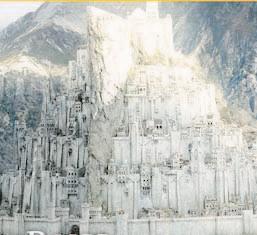

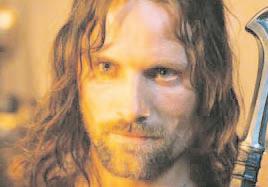


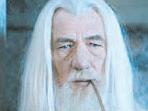
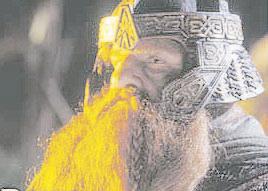
Heading for a eucatastrophe
By Richard Drabik
The quest to destroy the One Ring is beset with tragic events, sufferings and near-failures.
Yet it is not only through these sufferings, but also because of them,that ultimate good is reached.
Eucatastrophe is a word that
means the triumph of good through suffering. Tolkien defines eucatastrophe in theological terms: “The Birth of Christ is the eucatastrophe of Man’s history. The Resurrection is the eucatastrophe of the story of the Incarnation.
This story begins and ends in joy.”
As Christians we are called to live our life in the story of Christ,
THE STORY IN BRIEF
T h e F e l l o w s h i p o f t h e R i n g
The first film, The Fellowship of the Ring, is the story of Frodo Baggins (Elijah Wood), a hobbit from the Shire in Middleearth.
He inherits the powerful One Ring and must take it to the fires of Mount Doom to destroy it, thereby keeping it from its maker, the evil Lord Sauron. Frodo leaves the quiet Shire with his friend Sam (Sean
always mindful that our own story is a path pointing toward triumph.
It is not surprising that there is a sense of an omega point in this viewpoint; in the universe all things tend toward Christ—it is part of our being and story. Perhaps this is why Tolkien’s The Lord of the Rings strikes a chord in the Christian soul.
Astin), and two other hobbits on his epic quest.
At a council convened by the elf Elrond, the Fellowship grows to include two men, an elf, a dwarf and a wizard. The journey of the nine is fraught with danger, darkness, uncertainty, courage and friendship.
T h e T w o T o w e r s
In The Two Towers the companions of the Fellowship, who split up at the end of the first film, continue the quest. Isengard, the home of the evil wizard Saruman
Who was Tolkien?
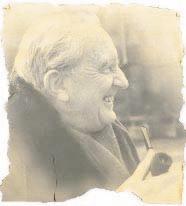 by Barbara Beckwith
by Barbara Beckwith
John Ronald Reuel Tolkien, known as Ronald to his family and friends, was born in Bloemfontein, South Africa, in 1892.
But he had few memories of Africa because his father died when he was four.
His mother brought him and his younger brother, Hilary, back to England, her family’s home.
They settled in the West Midlands, which includes Birmingham where Tolkien attended grammar school, and the rural hamlet of Sarehole where the family first lived.
According to the Tolkien Society, it was here that Ronald developed his love of words.
In 1900 Tolkien’s mother, Mabel, and her sister, May, were received into the Catholic Church. That decision estranged them from their Anglican relatives.
But Mabel held to her beliefs and raised her children Catholic.
After she died of complications from diabetes in 1904, the parish priest, Father Francis Morgan, took upon himself responsibility for the boys.
At college Tolkien first studied classics, then English language and literature at Exeter College, Oxford, receiving a first-class degree in 1915. He met a young woman, Edith Bratt, at his aunt’s boardinghouse but Father Morgan forbade him to see her or write to her for three years, until he was 21. Then he began to court Edith in earnest; she converted to Catholicism and they married in 1916.
Enlisting as a second lieutenant in the Lancashire Fusiliers in the First World War, he arrived in France just in time for the terrible Battle of the Somme. There Tolkien contracted a typhus-like disease which limited his future
military service. A number of his friends were killed in action. Tolkien’s direct military service in World War I and his civilian experience in World War II taught him of war’s cost yet bolstered his belief in the Catholic principle of a “just war.”
His first job after the war was as assistant lexicographer for the Oxford English Dictionary. In 1920 he was appointed the equivalent of an assistant professor at the University of Leeds.
He and Edith had four children: John Francis Reuel (who grew up to be a Catholic priest), Michael Hilary Reuel (who became a schoolmaster), Christopher Reuel (now a university professor and the keeper of his father’s literary works) and Priscilla (a social worker).
In 1925 Tolkien applied for a professorship in Anglo-Saxon at Oxford. But in 1945 he changed his chair to the Merton Professorship of English Language and Literature, which he kept until his retirement in 1969.
At Oxford he made friends with C.S. Lewis, whom he led back to Christianity. The Anglican Lewis went on to write books of inspirational theology and children’s books such as The Chronicles of Narnia
The Hobbit was published in 1936; The Lord of the Rings came out in three parts in 1954 and 1955. The following year it became a 12-part, condensed radio program on the BBC. The story first came to the United States in a pirated paperback edition in 1965, which generated a copyright dispute and much publicity.
The book, which has been interpreted as anti-consumerist, anti-atomic weapons, anti-development and pro-environment, eventually moved beyond countercultural circles and has been accepted as a fantasy classic.
Edith died in 1971, and Ronald in 1973. In a suburb of Oxford. They are buried in the Catholic section of Wolvercote Cemetery in a single grave.
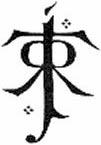
(Christopher Lee), aided by Wormtongue (Brad Dourif), unites with Mordor, the seat of the Dark Lord Sauron—hence the movie’s title.
The members of the Fellowship work to get some allies; for example, Pippin and Merry make friends with the ent Treebeard, a tree-herder that walks and talks.
Frodo and Sam convince the creature Gollum to guide them. Aragorn, Legolas and Gimli help defend the refugees of Rohan at Helm’s Deep, getting unexpected help from an army of elves.
The Return of the King concludes the odyssey of the Fellowship as its members engage in the final battle for Middleearth.
Sam battles the giant spider of all nightmares.
King Théoden (Bernard Hill) continues the fight, while Frodo and Sam press on to Mordor so that the One Ring can be destroyed.
The story continues ...
The Record CHRISTMASEDITION 25 DECEMBER 2003 17
T h e R e t u r n o f t h e K i n g

Meet the real Santa Claus
St Nicholas was a real person who was born to a wealthy family in Lycia, Asia Minor (now known as Turkey) sometime between 270 and 280 AD. He was orphaned at an early age and grew up in a monastery becoming one of the youngest priests ever at the age of 17 . He travelled to Palestine and Egypt before returning to Lycia to become Bishop of Myra.
Nicholas was a very generous man, known for his charity and wisdom, who gave away his wealth to those in need. He would often go out at night, disguised in a hooded cloak, to leave gifts of money, clothing or food for the poor and underprivileged.
He died on 6 December 340 and was buried in the church in Myra. After his death he was canonised, becoming the patron saint of Greece, Russia, children, scholars, merchants, sailors and travellers.
In 1087 religious soldiers from Italy took the remains of St Nicholas back to Bari in southern Italy where they built a
church in honour of him - the Basilica of San Nicola. This greatly increased his popularity in Europe, with pilgrims from all over the world coming to visit his shrine. Each of them took his legend back to their native countries where, as his fame spread, it took on the characteristics of
country. One thing remained common to all however, and that was the traditional image of the Bishop’s mitre, long flowing robes, red cape and white beard.


There are many legends surrounding St Nicholas, the most famous of which tells how he gave bags of gold to three poor sisters for their dowries, throwing them down the chimney where they landed in some stockings which had been hung up by the fire to dry. This gave rise to the custom of giving gifts on his feast day (6 December), a practice which is still followed in the Netherlands and Germany where children leave their shoes out on St Nicholas Eve and hope that they will be filled with sweets and gifts the next morning. Elsewhere this has been incorporated into Christmas due to his identification with Santa Claus - a corruption of his Dutch name of ‘Sinter Klaas’.
Christmas Crossword
Across
4Merry ______________! (9)
7 Brings presents to good boys and girls. (5,5)
9 These are made of wax and have wicks. (7)
Down
1A sock filled with goodies on Christmas day. (8)
2 Circular decoration often hung on doors (6)
3A red and white treat (5,4)
5A gift (7)
6 The sound bells make. (6)
8 Ice crystals (4)
10 A vehicle mounted on runners and pulled by horses or dogs; for transportation over snow. (6)

The Story Of Silent Night
On December 23, 1818 Father Josef Mohr, the young priest of St. Nicholas' Church in Oberndorf, Austria was worried - in 24 hours he was supposed to lead a Christmas Eve service, but he had no music as the organ had rusted and wouldn't work.
That evening he attended the town Christmas play but instead of going straight home afterwards he climbed the small mountain overlooking the town to try to get some inspiration. It was nearly midnight before he reached his room and sat down to write a new song that could be played on a guitar - at least that wasn't broken.
"Stille Nacht! Heilige Nacht!" he wrote - "Silent night, holy night." The night-time peacefulness of Oberndorf was fresh in his mind and he could imagine Bethlehem, bathed in moonlight:
All is calm, all is bright. Round yon Virgin Mother and child! Holy Infant so tender and mild, Sleep in heavenly peace.
It wasn't long before the simple song was finished and he could think of going to sleep.
The next morning he took the song to Franz Grüber, his organist and asked if he could compose some music for the words before that evening's service. Grüber set about the task quickly and in a couple of hours had finished - just in time to rehearse with the choir before the service. Mohr sang tenor, Grüber sang bass and the service went off beautifully. The song gradually became known throughout Europe and in 1834 the Strasser family performed it for the King of Prussia, who ordered it to be sung by his cathedral choir every Christmas Eve. The Rainer family singers brought it to America in 1839 and by the middle of the nineteenth century it had become popular around the world. However, by this time no one could recall its composer. It took a long time for word of the song's fame to reach the tiny villages of Austria but in 1854 Franz Grüber sent a letter to the leading musical authorities with his claim to have written the tune. In 1848 Father Mohr had died of pneumonia, but Grüber still had the original manuscript to show and gradually he was recognised as composer.
The Record CHRISTMASEDITION 18 25 DECEMBER 2003
The Christmas Tree
Although it is generally agreed that the Christmas tree in its current form came from Germany in the early 19th century, the tradition of decorating a tree to mark winter celebrations dates back hundreds of years to Roman times, when they used to decorate evergreen trees with small pieces of metal to celebrate Saturnalia.
In medieval times the 'Paradise Play' was performed every year on December 24. This depicted the creation of Man and the fall of Adam and Eve from the Garden of Eden and always included an evergreen hung with apples which represented the apple tree of temptation.
There is a legend that St Boniface, an English monk, came upon a group of pagans gathered around an oak tree who were preparing to sacrifice a child to the God Thor.
T h e p o p u l a r i t y o f t h e
C h r i s t m a s t r e e g r e w i n
B r i t a i n d u r i n g t h e f i r s t h a l f o f t h e 2 0 t h c e n t u r y , w i t h t r e e s
b e c o m i n g b i g g e r a n d m o r e e l a b o r a t e l y
d e c o r a t e d w i t h b e l l s , b a u b l e s a n d t i n s e l .
In order to stop the sacrifice, and save the child's life, St Boniface is said to have felled the tree with one blow of his fist. Later on, a fir tree grew in place of the oak and this, St Boniface told the pagans, was the Tree of Life and represented the Christ Child. Legend also suggests that, in the late 16th century, Martin Luther (the founder of the
began to sell shaped gingerbreads and wax ornaments which people bought as souvenirs of the fair and took home to hang on their tree.
Tinsel was also invented in Germany in about 1610. Up until fairly recently real silver was used, which was pulled into wafer thin strips by special machines. This was durable but tarnished quickly and many experiments took place to try and find an alternativeincluding a mix of lead and tin, which was too heavy and kept breaking. It was only in the mid 20th century that a viable alternative was found.

Artificial trees were invented in the 1880's in a bid to stop some of the damage being caused to real trees due to people lopping the tip off large trees, thus preventing the trees from growing any further. It got so bad in Germany that laws had to be brought in to prevent people having more than one tree.
Prince Albert, husband of Queen Victoria, is credited with being responsible for introducing the custom of the Christmas tree to the British public by decorating the first English Christmas tree at Windsor Castle in 1841 using candles, sweets, fruit and gin-
Christmas tree grew in Britain during the first half of the 20th century, with trees becoming bigger and more elaborately decorated with bells, baubles and tinsel.
However, the onset of the Second World War resulted in a ban on cutting down trees for decoration and people resorted to having small, artificial tabletop trees bearing home made decorations. These were often taken down into the air raid shelters when the sirens sounded to provide a bit of Christmas cheer!
This all changed following the war, and large trees were erected in many public places to celebrate Christmas. The most famous of these is the tree in Trafalgar Square, London which is an annual gift from the Norwegian government to give thanks for the help they received from Britain during the war.
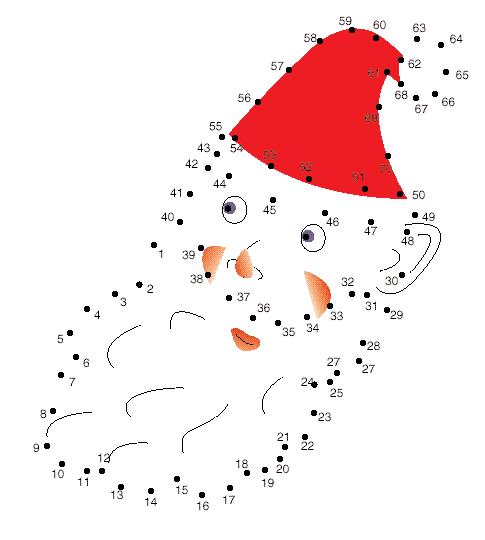
Join the dots on our Santa Claus
A is for Angels
With halos so bright
Whose carols were heard
On that first Christmas Night
B is for Bells
So merrily ringing
Joy to the world
Is the message they’re bringing
C is for Candles
That so brightly shine
To give a warm welcome
To your friends and mine
D is for Doorway
With garlands of green
To make Christmas merry
As far as they’re seen
E is for Evergreens
With fragrance so rare
So plentiful at Christmas
Their scent fills the air
F is for Fun
The whole season long
From trimming the tree
To singing a song
G is for Greetings
A merry “hello”
With a heart full of love
For people we know
H is for Holly
With berries so red
To make into wreaths
To hang overhead
I is for Ice
On snow covered hills
Where sledding is fun
Along with the spills
Jis for Jesus
The Christ child so dear
We honour his birth
On Christmas each year
K is for Kris Kringle
So merrily he stands
He is who they call Santa
In so many lands
L is for Lanterns
I am sure that their light
Helped Mary and Joseph
That first Christmas Night
M is for Mary
Her heart full of love
For her little son Jesus
Who came from above
N is for Noel
The angels did sing
To herald the birth of Jesus, our King
O is for Ornaments
So shining and bright
With lights on the tree
To sparkle at night
P is for Packages
With ribbons so gay
All ‘round the tree
For our Christmas Day
Q is for Quiet Christmas Eve Night
With snow covered hills
Glistening so bright
R is for Reindeer
Who pull Santa’s sleigh
To your house, to my house They know the way
S is for Shepherds
Who first saw the star
Over Bethlehem’s manger And followed it far
T is for Trees
We decorate so gay
Then wait for old Santa To hurry our way
U is for Universe
Where Christmas brings joy
To all in the world
To each girl and each boy
V is for Visiting
Friends near and far
We travel by plane
Or by bus, or by car
W is for Wise Men
Who brought gifts so rare And knelt down and worshipped
The child they found there
X is for Xmas
Or Christmas by full name
No matter the language
It all means the same
Y is for Yule Logs
Whose bright sparks fly high
To give a warm welcome
To friends passing by
Z is for Zeal
We show at this time
In giving to others
And loving mankind
The Record CHRISTMASEDITION 25 DECEMBER 2003 19
❄ ❄ ❄ ❄ ❄
A CHRISTMAS MESSAGE from Perth Auxiliary Bishop
Don Sproxton
Christmas has had a particularly interesting press this year. Who would have missed the story in "The West Australian" that celebrations of Christmas in one or two government schools might be offensive to students of other faiths.
As it turned out, we read wonderful letters to the Editor from a Buddhist abbot and some leaders of the other faiths disclaiming that celebrations of Christmas in this country cause offence.
Rather, they indicated their appreciation of Australia as a country that has the Christian tradition underpinning our culture, law and customs. The celebration of a Christian festival, to them, makes considerable sense, and what’s more, they gladly join us in our celebrations.
I had the feeling that the problem was not that other religionists found Christ and the celebration of His birth offensive, only the secularists.
There is little doubt that the very popular Christian festivals of Christmas and Easter are confronting to those who reject the existence of the Creator God of love who wants to be our partner through life. We have seen all sorts of moves in society to cut us from the roots of our being and life. There was the effort to demythologise everything, especially the sacred.
The object of this was to convince us that the only way to make sense of our world is to resort to human reason.
So our society today bears all the hallmarks of being divorced from the sacred and it is convinced that there is no other point of view.
The overemphasis given to the protection of our rights over responsibility is a

symptom of this divorce between the sacred and the secular. Having been severed from our roots in God, divine law and even natural law will be denied, and justice is being reduced to the level of a competition between my rights and your rights.
But what of the other point of view?
The story of Christmas testifies to the alternative way, which is positive and creative. God sees the world in terrible need because it is being overtaken by fear. In fact , whenever humanity decides to dethrone God and assume the title of the Self-contained, All-knowing and All-powerful, the affairs of the world go awry.
Christmas reminds everyone that God, seeing the state of things, invites us to
A CHRISTMAS MESSAGE from Geraldton Bishop Justin Bianchini
As Christmas time comes around again, it is an opportunity now more than at any other time of the year to focus on, reflect on, pray about and deepen our appreciation of our wonderful God who thought so much of us to take our flesh and dwell among us.
Only Christianity has an enfleshed God –a God who made the move, emptied Himself to become one of us and one with us. No other religion has this truth. All Religions have belief in a Supreme Being, but none have this wonderful reality of our Supreme God taking flesh.
In the early centuries even strong Christians found this hard to believe. Some said Jesus was a true man alright, but only a man, and because he was such a good man was elevated to a higher status as a special "Son of God". Others believed that it was unthinkable for God to become truly man also. They said that God’s Son took on a human appearance in Jesus but wasn’t really human.
Such people were in heresy, and I wonder how many people there are like this nowadays. Some would think of Jesus more as a man and neglect the Godhead in him.
Others concentrate more on the Godhead without believing how this God really mixed it with us and every aspect of our messy and broken world.
It is very hard to hold in balance and harmony both the Transcendental God (the God infinitely above us) and the Incarnate God (the God truly one with us). We have all this in Jesus, and it is to Jesus we must go at this time and ask his help to understand it a little better.
Christmas is a time to go to the humble crib and just be there in awe and wonder at this God whom the whole world cannot contain, taking flesh of the Virgin Mary
and being born as a tiny infant.
The next step we need to take is to see how Jesus takes flesh in my life. He is very close to me and part of my life and everything that happens.
We take a step further. We can stand in amazement at how Jesus identifies himself with each human being. He takes flesh in each person especially the least – the poor, unemployed, homeless, hungry, dispossessed, despised, refugees, outcast, imprisoned, sick, suffering, needy etc.
listen again to the history he has worked from the beginning.
It is not the politician tinkering with the social and legal fabric, nor the technician with the astonishing bag of innovative inventions who can save us and resolve what lies behind our fears. God has shown again and again that he loves us, wants our happiness and will do anything possible to help us achieve our happiness. The sending of his Son, born poor, among the poor, for the poor, was the way God determined to relieve us and support us. For the one who realises that they are poor, lacking all the answers and knowing their limitations in love and tolerance, God’s gift of the incarnation is good news.

Blessed Mother Teresa of Calcutta inspired and influenced many in her lifetime, and from her place in heaven, continues to be a shining light for us all. It is said of her (who with her Sisters, spent an hour in prayer before the Blessed Sacrament each evening) that when she looked at the Blessed Sacrament, she saw the poor. When she tended to the poor and dying she saw Jesus.
In other words we cannot truly believe in God Incarnate without seeing Jesus in ourselves and in others, especially "the least of my brethren". The incarnation means all this.
The more Jesus becomes enfleshed in us, the more we become better means of Jesus being born again in the hearts of others. Two great models of this are people that we have been thinking of quite a lot this year, namely, Mother Teresa and Pope John Paul II. There are good people around us though who are very close to God and who help us come closer to that same God. All this leads us to praise God.
"Blessed be the Lord the God of Israel, he has come to visit us and set us free". The father of St John the Baptist, Zachariah, said this and it is recorded in the Gospel of Luke. What Christmas says to us is that God not only visited us, but also stayed with us. A very Happy and Peaceful Christmas to all.
Instead of deserving the great gift of God’s love, we deserved condemnation, as we are reminded by St. Paul.
However Divine Love acts not according to our human understanding of rights. St. Peter Chrysologus wrote, " How could the narrowness of human vision enclose God whom the world cannot contain? The law of love has no thought about what will be, what ought to be or what can be.
Love knows nothing about judgement, is beyond reason, and is incapable of moderation. Love takes no relief from the fact that its object is beyond possibility, nor is it cured by difficulties.
If love does not attain what it desires it kills the lover. So it goes where it is led, not where it ought to go".
For the love of every person, God allowed his Son to become incarnate and be our Saviour, for we are incapable of saving ourselves.
The Christmas blessing for each of us would be that we recapture that vision of God, the only one we should never fear, who is our champion and companion, whose love for us all is as boundless as it is incomprehensible. Another blessing of Christmas would be, in the words of Chrysologus, that in each of us the God of love" breeds desire that becomes so inflamed" that we will want to be with God.
"This is why love that longs to see God has the spirit of devotion even though it lacks judgement. That is why Moses dares to say, ‘If I have found favour in your sight, show me your face’".
May you receive peace and joy as you grow in the knowledge of God’s love, and may you discover his nearness in your prayer and in your Christian community.
A CHRISTMAS MESSAGE from Bunbury Bishop Gerard Holohan
Iwas a bit taken aback recently when a Church leader told me he had received a death threat. He had suggested that the world would be different now if reaction to the horror of the errorism against the New York World Trade Centre had been based upon Christ-like love, not military might and violence, particularly against Iraq.
It is striking too how little attention has been given to the injustices experienced by the Palestinian and Arab peoples over many life times.
Media articles today discussing solutions to the Arab-Israeli and other conflicts in the that region ignore these injustices.
We know now that many terrorists are emotionally damaged people who saw their parents and families killed by bombs and other weapons when at a young age. While this does not justify their crimes, we still need to learn from it.
And in Australia, we read of people justifying the detention of women and children for years while the genuiness of their refugee status is being tested. What will be the emotional impact of these sufferings on these children in future?
When visiting schools, I often ask myself how as a nation did we learn to so repress our humanity that we can tolerate primary school aged children, and younger, being kept in such inhumane conditions?
How can Australian parents and grandparents of children the same age accept this situation? Christians believe that the end can never justify such means.
Over Christmas, we will be celebrating Christ’s birth. But how many Australians really get what Jesus was on about?
He came to give us another way – the way of God’s love and justice, the way that leads to true peace. He spoke of turning the other cheek, and forgiving as God does – which is always.
Two of the reasons why Jesus came were ‘that we might know God’s love’, and ‘to be our model of holiness’. Let us celebrate this Christmas by asking whether or not we are reflecting on the issues of today in ways that advance the reasons why Christ came.
Lasting solutions to today’s complexities will not be found unless we analyse the problems and develop responses in ways that are based upon the way of Christ.
Jesus Christ was born into a Roman empire that imposed peace by military might and conquest. The ‘peace by force’ mind-set of the Emperor Augustus was not much different from the prevailing mind-set of many individuals, governments and media today.
The angels sang of the ‘Peace on Earth’ Christ would bring. We know now that, to find such peace, we need to follow his way. A truly Gospel mindset is the only way forward for today’s world. This is true not just at the international level, but also at the level of marriages and families in which there are problems.
May we all be prophets of the way of the Christ-child this Christmas. Ridicule and other reactions will be a small price to pay for the real peace Christ came to bring that first Christmas.
Christ’s peace and blessings be with you all.
The Record CHRISTMASEDITION 20 25 DECEMBER 2003
Read any good books lately?
Would you like to know more about your faith, buy don’t know where to start? Fr John McCloskey may have the answers you are looking for with his plan for a lifetime of spiritual reading.
By Father C. John McCloskey
The purpose of our lives as Catholics is to become saints. By God’s grace, we can collaborate with Him on that lifelong task. You know many of the ways already, and an indispensable one is spiritual reading, which is accessible to all who are literate. As Blessed Josemaria Escriva put it: "May your behaviour and your conversation be such that each person who sees or hears you may say, ‘This man reads the life of Jesus Christ.’"
Let’s look at the present situation of the majority of Catholics in North America and Europe. I think I am accurate, unfortunately, in saying that the great majority of the several hundreds of millions’ only exposure to the Bible is for approximately 10 minutes at Sunday Mass. In addition, most of them have a rudimentary Catholic catechetical education that usually finished at an early age. Therefore, they don’t know Sacred Scripture, and they barely remember, at best, the Catechism. In addition, a paltry few are familiar with any of the great Catholic spiritual classics.
On the other hand, their sight and hearing are assaulted by a daily barrage of stimulation that appears to be designed by the devil, or at least by his many friends here on earth, to keep us immersed in the world of the ephemeral and our minds off the supernatural life.
Most people read only books and magazines that are consistently and increasingly trashy. The movies they watch are full of violence and sexual stimulation, as is much of the popular music. The TV is on an average of seven hours a day in the typical American home, turning many people into zombies fit for manipulation. Its only competition is not the healthy enjoyment of each other’s company in the family, but rather computer games or the Internet, where serious temptation is only a click away.
I think this is an accurate portrayal of everyday life for hundreds of millions of Catholics. Happily, this is not yet the case in all parts of the world, but given the current hegemony of the secular West, it may be soon. What is a remedy for this soulstultifying if not soul-destroying assault by the culture of death? One answer is Catholic spiritual reading, which is available for all who have eyes to see or ears to hear (Let’s not forget books on tape!) and money to buy books or libraries to borrow from.
Reading has made many saints
I believe it would be difficult to think of any saint who was not deeply influenced not only by spiritual reading before he dedicated himself to God’s work on this earth, but also who did not continue spiritual reading as an integral part of his daily routine until death.
St. Thomas Aquinas says: "Nothing is in the intellect that did not first come to us through the senses." The wonderful part of it is that we are at a distinct advantage, as the years and centuries go by, as we certainly could never begin to cover even a small portion of the hundreds of thousands of great spiritual classics and of the poetry and prose inspired by a Catholic worldview.
Look at the example of St. Augustine, who heard that "Tolle et lege" (Pick up and read!) and opened the Gospel to a section that changed his life, and the course of Christian civilisation as a result. St. Anthony, the founder of monasticism, was so moved by reading the story of the rich
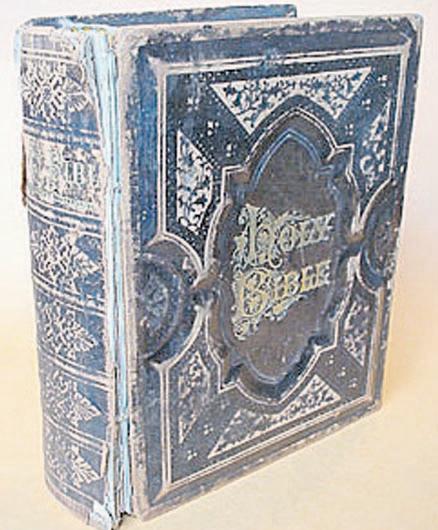
young man that he followed the injunction, "Sell everything you have, give it to the poor, and come follow Me." Without his obedience to the Word, who knows if Christianity could have survived the onslaught of the barbarian invasion. St. Ignatius, recuperating in his bed from grave battle wounds, threw away the equivalent of today’s pulp fiction, started spiritual reading that inspired him to change his life radically, embraced Christ and founded the Jesuits, the great champions of the Catholic Reformation. World history again changed.
T h e T V i s o n a n a v e r a g e o f s e v e n h o u r s a d a y i n t h e t y p i c a l A m e r i c a n h o m e , t u r n i n g m a n y p e o p l e i n t o z o m b i e s f i t f o r m a n i p u l a t i o n
Or in more modern times, think of the young Anglican divine, John Henry Newman, who, reading over and over again the Fathers of the Church, came to realise that, as an Anglican, his position was analogous to a Semi-Pelagian. He read the arguments of St. Anthanasius, who said that only the Catholic Church "surely rules the world," and the Church was graced by one of its greatest converts whose thought still affects us today.
Take a look at the modern spiritual writer Thomas Merton, who, out of idle curiosity, picked up a book by Etienne Gilson, the great French Thomist, on "The Elements of Christian Philosophy," and was drawn to study more closely the claims of Catholicism. His study led to conversion and eventually a vocation as a Trappist monk. Flannery O’Connor, the great
Southern Catholic author, made a point, she told us, of reading at least 20 minutes of the Summa each day, and her writings are suffused with the common sense and even irony of the Angelic Doctor. These are just a few of the many examples that can be cited. In fact, I am sure virtually every reader of this article could tell us his own story in that regard or will be able to tell it soon!
In the apostolic blueprint for our century, "At the Beginning of the New Millennium," the Holy Father urges us to "contemplate the face of Christ." One of the primary means he points to is Sacred Scripture: "Scripture has its rightful place of honour in the public prayer of the Church. … It is especially important that listening to the word of God should become a life-giving encounter, in the ancient and ever new tradition of lectio divina, which draws from the biblical text the living word which questions, directs and shapes our lives."
Sacred Scripture — according to the Catechism of the Church and the Second Vatican Council — is the speech of God as it is put down in writing through the breath of the Holy Spirit. The Bible is composed of books in the New and Old Testaments, 72 books confirmed as canonical (or divinely inspired) by the Church at the provincial Council of Hippo in 393. It is not only our guide to salvation, from which flows virtually all Catholic theology and practice, but also forms the basis for Christian culture.
Without the Bible, we surely would all be nature worshippers or worse. To paraphrase the Catechism: The truth that God revealed, for the sake of our salvation, He confided to the Sacred Scripture. But since the Holy Spirit worked through human authors, who used many literary forms to communicate His message, it is under-
standable that we look above all to the Church to guide us to the proper interpretation. After all, even St. Peter found some of St. Paul’s writings puzzling! This all time bestseller, by far the most quoted book in history, must be our favourite book, to be read and mediated upon for at least a few minutes each day in an orderly fashion. We could call the Bible the never-ending book since once we finish it, we simply begin it again, over and over, until God calls us to himself. It is most important that we learn how to live from it and make daily resolutions to that effect. Over time we will find the stories of the Bible, especially from the New Testament, as familiar as the story of our own life, and we will begin to live in Christ, being soaked in His words and example.
The Bible will be a frequent inspiration for our meditation and a primary text for our work of evangelisation. Having a large Bible for home and a pocket-sized version of the New Testament will assure that our book is never far from us. The home version should have, if at all possible, a commentary concentrating more on the practical, spiritual or ascetical sense of Scripture rather than the hermeneutical or exegetical. The commentary should be faithful to the teaching of the Church. The Bible above all is a book whereby you learn how to live the Christian life, rather than settle arguments on interpretation. Happily, in more recent times, there are several that fit that bill nicely. Some good books on Christ and His life, such as Frank Sheed’s "To Know Christ Jesus" or Fulton Sheen’s "Life of Christ," also can help you to "contemplate His face."
A good complement to the daily reading of Sacred Scripture is the reading of a spiritual book, normally recommended by your spiritual director. As a whole universe of books could not tell all that Jesus did and taught in His life, it will be impossible ever to run out of classic Catholic spiritual books. These books can include works from the magisterium of the Church, lives of and books by the saints, works of theology and a plethora of Catholic spiritual classics.
The reader should be working on just one book at a time, which he should read from beginning to end, perhaps taking notes or otherwise highlighting those points that particularly strike him, so that way they may be brought to his silent prayer, or to conversation in spiritual direction. As the Catechism says: "Seek in reading and you will find in meditating; knock in mental prayer and it will be opened to you by contemplation" (no. 2654). Good spiritual reading will lead to prayer, selfdenial and an ever-growing desire to evangelise family, friends and the culture.
Just a few words of practical advice in ending: when you do your spiritual reading, put yourself in God’s presence and invoke the Holy Spirit. Make sure you are fully alert and located in a well-lit space, far from distractions. That’s right — not late at night and in bed. Don’t you think God’s Word and great spiritual classics deserve better than that? The reading need not last more than 15 minutes, but never less. Pope John Paul II urges us to follow the Lord’s command: "Go out into the deep for a catch." Our commitment to spiritual reading on a daily basis will help to make us "fishers of men."
—Father McCloskey is director of the Catholic Information Centre in Washington, D.C., and a priest of Opus Dei. His Catholic Lifetime Reading Plan is available at www.cicdc.org.
The Record CHRISTMASEDITION 25 DECEMBER 2003 21
WORD Sunday the
by Norma Woodcock
H O L Y F A M I L Y Y E A R C
The readings today have a theme that guides us in how to grow toward the ideal model of the Holy Family of Jesus, Mary & Joseph.
In the first reading, Samuel 1:20-22, 24-28, we have the story of Hannah who had been barren, she prayed for a son & when her prayer was answered she dedicated her child to God for the whole of his life.
Parents, we are called to hand over our children to the Lord daily and then to trust him to bring them to himself.
In the second reading, 1John3:1-2, 21-24 we hear of God’s commitment to us and of the commitment God requires of each of us, to himself and to each other as family. Then the Gospel, Luke 2:41-52, tells of Jesus being lost in the Temple when he was twelve years old. His seeming disappearance when Mary and Joseph were on their way home.
E v e n J e s u s h a d t o s u b m i t t o t h e n a t u r a l o r d e r o f a u t h o r i t y , w e a r e c a l l e d t o d o t h e s a m e a n d t h e n w e l i k e J e s u s w i l l g r o w i n w i s d o m , s t a t u r e a n d g r a c e .
His parents were surprised when they found him in the Temple. Jesus replied to his mother, ”why were you looking for me? Did you not know that I must be busy with my Father’s affairs.” These were Jesus’ first words in the Gospel. He himself proclaims who he is. Then we are told, he went with his parents and lived under their authority. ‘And Jesus increased in wisdom, in stature, and in favour with God and man.’
Even Jesus had to submit to the natural order of authority. We are called to do the same and then we, like Jesus, will grow in wisdom, stature and grace.
On this feast day of the Holy Family, I would like to focus on the relationship of husband and wife.
Many years ago I visited a nursing home for elderly people and one of the women began to share with me her life story. It was a sad story and I wanted to give her a word of comfort. She then mentioned her husband. “Your husband dear?” I asked. “Oh, he’s dead,” she replied in a flat voice. I thought to myself, well now I can give her a word of comfort about him. “Never mind,” I said, then added brightly, “but you know he’s waiting for you with the Lord.” “Oh God, I hope not,’ she exclaimed, her face twisted into a bitter expression. We both laughed together, but deep inside my heart I felt consternation. How sad, I thought, that this sacrament of marriage had ended in such deep aversion.
The challenge for some of us today is to look at our marriages. Is there life and love flowing between us or has there developed an existence of endurance, of apathy or of downright hostility? Have we decided to live our vow of ‘till death do us part?’ Yet all there is is death.
The pressures of the society in which we live work so much to undermine what is a truly supernatural union.
But underlying the external pressures is the internal turmoil made up of all the accumulated unresolved hurts of marriages. The lost dreams the unmet needs, the wounds we have inflicted on each other and our sinful reactions to all of these circumstances.
Yet Christ came to restore our marriages and our families. Let us ask him to do so and then co-operate with his grace as he works out his plan for us day by day.
New faithful have special role
An expert in Church history greatly admires those who "thought their way to the truth" in the 19th century, but insists that modern day converts are even more remarkable.
Father Charles Connor recognises that people who feel called to become Catholics today must choose to embrace a Church that is attacked by secularism even as it recovers from post-Second Vatican Council turmoil.
The author of "Classic Catholic Converts" (Ignatius) and host of an EWTN series on the topic, Father Connor shared with ZENIT what challenges the new faithful have faced and what gifts they have brought to the Church in recent centuries.
Q: What compelled you to write this book?
Father Connor: It was a combination of interest in the Catholic intellectual revival of the 1920s and 1930s, as well as a longstanding fascination with British Catholic history.
The story of the Catholic Church in Britain, especially since the Reformation, is the story of so many converts who came to the Church in a wide variety of ways and contributed so substantially to its buildup. At the same time, many of these same individuals in the 20th century were the writers and thinkers who so convincingly and intellectually defended the Church, thereby attracting others to it.
Perhaps a final thought is my admiration for so many who, by their own power, thought their way to the truth.
Q: What is a common theme among these very different conversion stories?
Father Connor: There would be a few.
One was a search for truth in unity and completeness in doctrine. So many converts were disillusioned by the confusion rampant in their faith traditions -- each person appeared to be an authority to himself or herself, using entirely subjective criteria of private judgment in all matters of belief.
Another common area was the growing awareness of the real presence of Our Lord in the Most Blessed Sacrament -body, blood, soul and divinity. It was a serious lack in all other Christian traditions; even in those rare instances where an ecclesial body claimed to possess it, such claims were proven invalid in the minds of those who kept investigating.
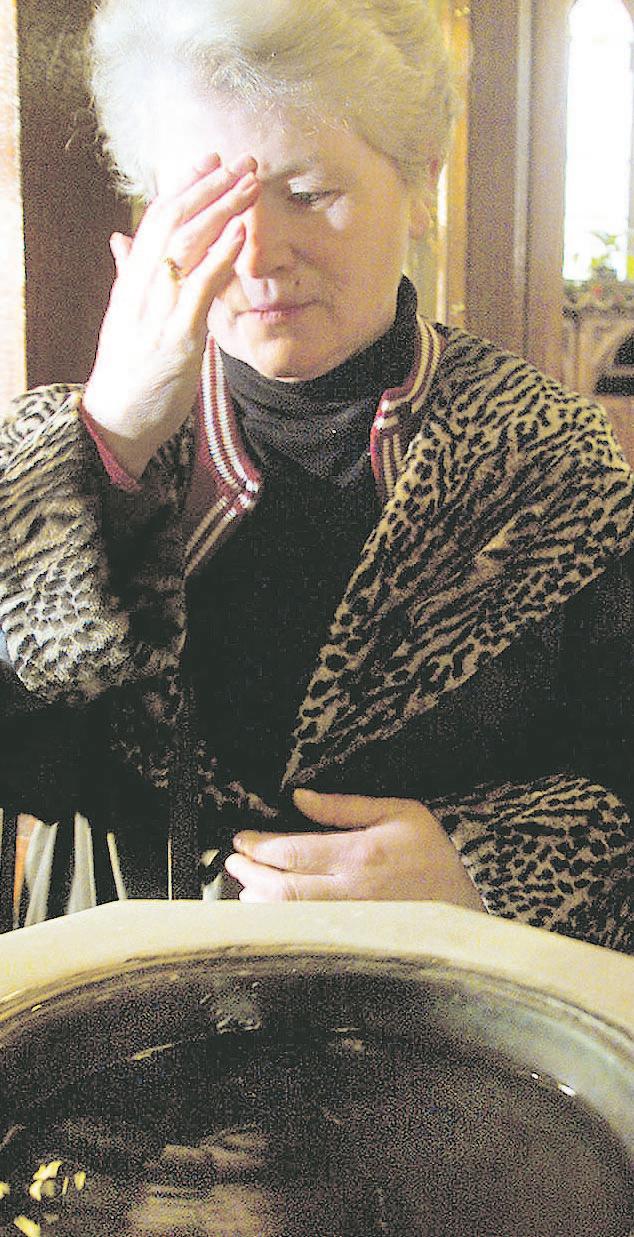
Still another similarity was the consolation so many discovered in the Church's teaching on papal supremacy, or the doctrine of papal infallibility. They provided such a clear road map of life and the assurance that all who listened to the vicar of Christ were listening to Christ himself, building his Church as he did on the rock of Peter's confession of faith.
Q: What were some of the most dramatic struggles the converts in your book faced?
Father Connor: The biggest challenges were overcoming some of their innate and deeply held prejudices against the Church of Rome, working their way through an obstacle that was hindering their reception into the Body of Christ and, so often, facing rejection and being ostracised by their families and friends -- those they held closest.
Q: How have these struggles changed throughout history? Are they the same in modern times?
F a t h e r C o n n o r : Today the struggles
would be quite different, in that they would have an added dimension: modern secularity, from which the Church has not been immune; and post-Vatican II confusion. Today the potential convert witnesses the Church in disarray, including theological variation from Church doctrine, dissent from within, generations of Catholics who have lost their way morally, etc. Therefore, it is all the more poignant when one enters the modern day Catholic Church. It's still the one sure foundation, still the Church established by Christ, still the ecclesial body where the fullness of truth may be found, but subject nonetheless to the turmoil that has followed every general council in Church history.
Also, one would have to mention the false perceptions about ecumenism which have become part and parcel of our times. Real ecumenism should be no obstacle whatsoever to convert making -- in fact, it should enhance it. Unfortunately, in some minds, the concept has come to stand for religious indifference or the view that one religion is the same as another.
Q: How do converts, in general, enrich the Church?
Father Connor: They bring an enthusiasm that is often lacking in cradle Catholics. They have arrived at the faith through various channels and they deeply treasure what they have found. Also they bring a tremendous fervour and spirituality, which enhances the household of faith tremendously.
Q: What can the Church do to encoura g e m o r e c o n v e r s i o n s a n d s u p p o r t those who are seeking full union with the Church?
Father Connor: Priests can and should do far more preaching about it from the pulpit. If one is truly proud of what one has and is convinced of its correctness, does it not follow that it should be shared with as many others as possible?
Groups such as the Catholic Evidence Guild should be encouraged. Convert inquiry classes should spring up both on the diocesan and parish level. Books of apologetics, either new or reprinted, should be circulated.
More than anything, Catholics should not hide their talents or their faith under a bushel basket -- individual initiative is so often the best means. This can certainly be achieved by the quality of our lives, but even more so by very directly putting the question to someone we may know and saying, "Have you ever thought of becoming Catholic?"
Hayden tries to find time for God everyday
c o n t i n u e d f r o m p a g e 1 0
‘So I’d like to see the perception turned around a bit, because there’s a lot of characters in this side that do a lot of good.’
Hayden’s goal is noble and his point reasonable, considering the Aussies were named the fairest side and the bestbehaved in the ICC competition. But the reality of competitive sport is that passions are going to boil over occasionally and those very public tantrums are going to make headlines.
He concedes that it’s sometimes hard to show brotherly love when your opponent’s trying to take your head off with a cricket ball.
‘The blokes are very passionate, sure,’ he says. ‘We’re always going to be fighters, but that’s being Australian. And you do have to hold your own mentally on the field—it’s a key to success.
‘Anyone you face in international cricket can get you out, and can hurt you as well,’ he concedes. ‘We all have a healthy respect for each other.
‘Everyone’s very skilled, so if you don’t have it together, if you don’t have that composure, you never make it. I suffered
from that early on in my career, needing that mental composure at the top level to really tough it out and succeed.’
Beyond physical injury, in terms of damaged reputations, Hayden is quick to stick up for Shane Warne—a team-mate sidelined by poor choices rather than poor form. He urges people to show grace, not condemnation.
‘I think Shane’s got a good chance to come back into the side,’ he says.
‘He’s a great player…and with that comes an enormous responsibility and sometimes there’s fabrication of a lot of things as well.
‘The fact is that everyone in life needs compassion and support. You come across choices in your life…things happen and at the end of the day it shouldn’t stop you from giving support.
‘Part of the ethos of the Australian cricket team is to support [each other] and have compassion. Because when you’re playing at the highest level you’re under a lot of pressure and there’s a lot of different things. You’re away from your family—it’s a pretty tough life. So, together, you stick through thick and thin.’
I ask Hayden what he’d like to be remembered for—his achievements as a cricketer, his character, or his qualities as a loving husband and father.
‘All of that, I hope,’ Hayden answers sincerely.
‘I’m a pretty simple person who enjoys life, loves his family, the ocean, surfing and fishing. I enjoy things that don’t cost a lot of money. I just enjoy life, and if I can share those things with good friends and family, I’m very happy.’
He adds that he is probably most at peace —closest to God, and at one with the world—when he’s home with his family on Straddie.
‘I tend to find time for God every day; but when you’re in "down time" there’s no doubt you can just chill out a bit more and relax. We are in a very beautiful place; the other night I was out handfeeding dolphins.
‘You can recognise the beauty of life, just as you can see God’s beauty in the smile on a little Indian girl’s face who’s got nothing, and yet can offer a smile—you don’t have to have a million dollars for a smile, do you?’
on
R e a l e c u m e n i s m s h o u l d b e n o o b s t a c l e w h a t s o e v e r t o c o n v e r t m a k i n g - - i n f a c t , i t s h o u l d e n h a n c e i t . The Record CHRISTMASEDITION 22 25 DECEMBER 2003
eye Catcher CLASSIFIEDS
BUILDING TRADES
BRICK re-pointing.Phone Nigel 9242 2952
ELECTRICIAN, Power/light points from $50 each. Rewiring our speciality. 0418 941 286, 9279 5008.
LIC.PLUMBER/gas fitter, Contact John on 9457 7771, Mobile 0412 185 209.
PICASSO Painting.Top service.Phone 9345 0557, fax 9345 0505.
PERROTT PAINTING Pty
Ltd for all your residential, commercial painting requirements.Phone Tom Perrott 9444 1200.
CATHOLICS CORNER
RETAILER of Catholic products specialising in gifts, cards and apparel for all occasions.Ph:9456
1777.Shop 12A, 64-66 Bannister Road, Canning Vale.Open Mon-Sat
ALL areas.Mike Murphy 0416 226 434.
HUMBLE MESSENGER
RELIGIOUS CATHOLIC SHOP 16/80 Barrack Street, PERTH (inside Bon Marche Arcade).New phone number:9225 7199.
RELIGIOUS PRODUCTS
Bibles, Books, CD’s, Cards, gifts, Statues, Baptism & Communion Apparel, Albs, Vestments and much more. RICH HARVEST,39 Hulme Court,Myaree,9329 9889 after 10.30am.
VESTMENTS
KINLAR Vestments, albs, copes, stoles, frontals, chasubles, coffin palls.altar cloths, graduation gowns. Ph:9378 4752
Why not start the new year with an advertising strategy that will work.
Call Carole McMillen on 9227 7080 to find out how The Record could be working for you!
VISITING SYDNEY
Why not stay at
STORMANSTON HOUSE
27 McLaren Street,North Sydney Restful & secure accommodation operated by the Sisters of Mercy, North Sydney.
• Situated in the heart of North Sydney and short distance to the city
• Rooms available with ensuite facility
• Continental breakfast, tea/coffee making facilities & television
• Separate lounge/dining room, kitchen & laundry
• Private off-street parking
Contact:Phone:0418 650 661 or email:nsstorm@tpg.com.au
official diary
DECEMBER
24Christmas Family Mass,Lockridge
25Midnight Mass,St Mary's CathedralArchbishop Hickey
Midnight Mass,Kwinana - Bishop Sproxton
27Eucharist,Mirrabooka - Bishop Sproxton
28Mass for Feast of the Holy Family, All Saints' Chapel,Allendale SquareArchbishop Hickey
31New Year's Eve Vigil and Midnight Mass, St Mary's Cathedral - Archbishop Hickey
The staff of The Record: Peter, Bronwen, Debbie, Carole, Kylie and Hugh wish all our readers a happy and holy Christmas rich in blessings from God.
Classified ads: $3 per line (plus GST) 24-hour Hotline: 9227 7778 Deadline: 5pm Monday
Sunday,December 28
ETERNAL WORD TELEVISION NETWORK:1 - 2 PM ON ACCESS 31: New Year message from Archbishop Hickey.Dinner with Alex Jones: an account of his conversion (EWTN Global Showcase).The Rosary Christian Tutorial Association thank all those who have contributed to the support of EWTN programs on Access 31,and extend to everyone best wishes for their happiness throughout the coming year. Postal address:PO Box 1270,Booragoon 6954.
Sunday Dec 28
FEAST OF THE HOLY FAMILY
All Saints Chapel 77 Allendale Square Perth.Mass 9.30am Celebrant – Archbishop Hickey.Make it a family day with Holy Mass and BYP Picnic lunch down from All Saints Chapel off Sherwood Court on The Esplanade.You’ll like it and the kids will love it.Parking available in the area streets,Terrace Rd Car Park (70 cents per hour),The Esplanade Hotel ($3.50 all day),Concert Hall ($1.20 per hour). Blessings of the day with prizes and good fun for all.
Sunday December 28
BULLSBROOK SHRINE PILGRIMAGE
Shrine of Virgin of the Revelation,36 Chittering Rd,Bullsbrook.The next monthly pilgrimage in honour of the Virgin of the Revelation,will be held at the Shrine on the last Sunday of the month,at 2.00pm. Pilgrimage Mass at 2.30pm.All are most welcome.Reconciliation is from 1.30pm prior to the Pilgrimage.Bus transport for the Pilgrimage departs Barrack St at 12.30 for Bullsbrook via Highgate,Guildford and Midland.For bookings tel.0409 296 810 or 9277 5378 For further information contact SACRI on 9447 3292.
Wednesday December 31
NEW YEAR’S EVE MASS
11.30pm Sign of Peace Midnight.Start the New Year with Reception of Holy Communion.Holy Spirit Chapel,85 Boas Avenue (opposite Public Library) Joondalup.Enq 9301 4111.
Wednesday December 31 - Thursday January 1
NEW YEAR’S EVE ALL NIGHT VIGIL & MIDNIGHT MASS
Principal Celebrant:Archbishop Hickey.St Mary’s Cathedral,Victoria Square,Perth.Begins 11pm with Rosary,midnight Mass & prayer of Dedication of the New Millennium to the protection of Mary,followed
by Exposition,prayers and Benediction till 7am Holy Mass.Tea/coffee provided.Parking in Cathedral grounds.
Thursday January 1
BULLSBROOK SHRINE MIDNIGHT MASS
SACRI:Fervent Soldiers Of Christ The Immortal King warmly invite you to celebrate on New Year’s Eve,the Solemnity of Mary Mother of God at the Pilgrim Shrine,Virgin of the Revelation,36 Chittering Rd, Bullsbrook.A Candlelight Rosary procession commences at 11.30pm followed by Midnight Mass.All are invited to welcome in the New Year by honouring Mary,the Mother of God.at her Shrine.Enquiries:Tel. SACRI 9447 3292.
Thursday January 1
NEW YEAR’S DAY LATIN MASSES
St John’s Pro-Cathedral,Victoria Ave Perth 8am and 10.30am.With Exposition of Blessed Sacrament in between and Benediction before 10.30am Mass.Plenary Indulgence under usual conditions on Dec 31 to faithful who recite publicly the Te Deum.Plenary Indulgence on Jan 1 to faithful who publicly recite the Hymn Veni Creator.All Welcome. Enquiries Fr Michael Rowe 9444 9604.
Friday January 2
ALLIANCE AND TRIUMPH OF THE TWO HEARTS
All night vigil of devotions and reparation to the Hearts of Jesus and Mary at St Bernadette’s Church Jugan St Glendalough.Commencing at 9pm with Holy Mass,concluding with Parish Mass at 7.30am followed by Rosary and Benediction.Light refreshments available during the night.Enquiries 9342 5845.
Saturday January 3 DAY WITH MARY
Blessed Mary MacKillop Church,16 Pelican Parade,Ballajura.9am5pm.A video on Fatima will be shown at 9am.A day of prayer and instruction based upon the messages of Fatima.Includes Sacrament of Penance,Holy Mass,Eucharistic Adoration,talks,rosaries,procession and Station of the Cross.Please BYO.Enq:Franciscan Friars of the Immaculate 9574 5204.
CHINESE CATHOLIC COMMUNITY MASS Every last Sunday of the month,Holy Family Church,Como at 4pm.All welcome
Family Prayer - some success secrets
Continued from Page 4 prayer list to which everyone can add their intentions. It can have two columns with these headings: ‘Thank you, God, for . . .’ and ‘Lord, hear us’ or something like that. If the prayer list is posted on the fridge door or kitchen bulletin board, it will be handy for everyone.
Such a prayer list will remind the family to not only ask for things, but also to give thanks. It can also be read by one of the children at the beginning or end of the meal to give focus to the prayer that is said by everyone.
Discuss what happened at church. On the weekend, it would be good to ‘bring church home’ by talking about the Saturday/Sunday Mass. (This is especially good for families whose members must attend different Masses due to conflicting commitments.) Mum or Dad can ask the children what the Gospel was, what was one thing Father said during his homily, what was the best song, and who they prayed for.
Bedtime
Besides mealtime, the other moment when most families try to pray is bedtime. This often begins early in family life, with parents going into the bedroom with small children to pray together: ‘God bless Mummy, God bless Daddy, God bless Grandma and Grandpa . . .’ and the pets and so on. But parents soon tire of this endless litany, and find themselves sending the children off to bed with an admonition: ‘Don’t forget to say your prayers.’ After a while, even this can be forgotten.
As children get older, family members go to bed at different times. It might be good to pray night prayers together before everyone actually goes to bed. Try this: during the evening, call everyone into the lounge room (while they are still awake!). If people are watching TV, do this during a commercial break –and turn off the TV.
Then, ask if anything special or important is happening the next day. Bring to everyone’s attention things happening
at school, at work, and in the nation or the world. Ask Our Lady to be the loving mother of the family and all those named in the prayer intentions, and say a Hail, Mary. Then ask the angels to watch over the family that night and say the prayer, ‘Angel of God, my guardian dear, to whom God’s love commits me here, ever this night be at my side to light and guard, to rule and guide. Amen.’
Using the thumb, Mum and Dad can trace the sign of the cross on the forehead of each child, just as they did on the day of Baptism.
The TV can now be turned back on, and family members can go back to what they were doing – or to bed.
There is a lot more that can be done, but this is a start. Family prayer is one of those things that must be worked at, but it is one of those formative experiences that shapes children’s future attitudes and practices of prayer. This holiday season, try it again. And remember: the family that prays together stays together.
Some suggestions from Fr Tim for Family Prayer
MEALTIMES
Keep a Bible in the dining area - a cheap paperback version is best
Make a family prayer list - things to ask God for
Discuss what happened in church
BEDTIME
Avoid going mechanical - pray for things that are immediately obvious eg.what’s coming up the next day Get the full benefit from TVAdvertising - turn it off and pray during an ad break
panorama
a roundup of events in the archdiocese
FURNITURE REMOVAL
The Record CHRISTMASEDITION 25 DECEMBER 2003 23
The Catholic Development Fund Chairman, Committee Members, Fund Manager and Staff extend to you and your family this Christmas wish ...
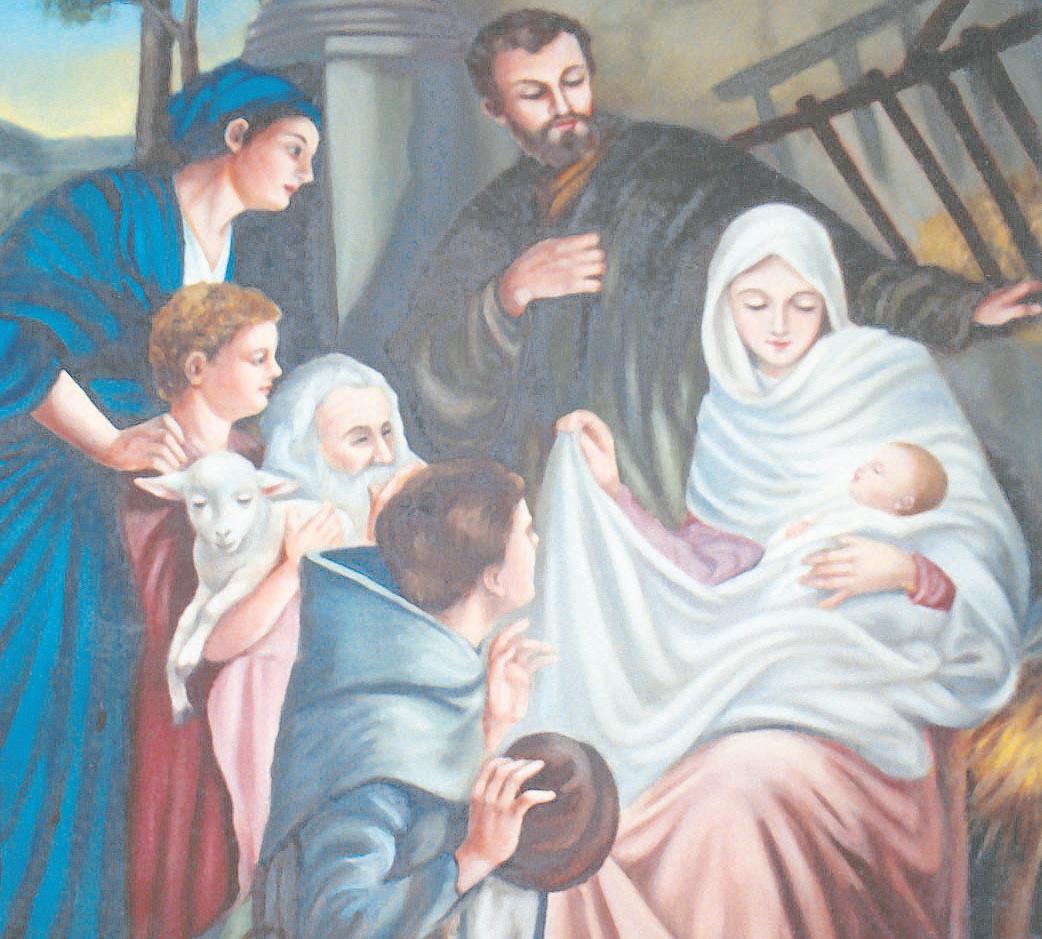
... may you have the Spirit of Christmas which is Peace, the Gladness of Christmas which is Hope, the Heart of Christmas which is Love.
2004
Let us pray during 2004 that all ethnic cultures throughout the world will be more tolerant of each other, show respect for each other's beliefs and co-exist in peace and friendship for the betterment of all mankind.

PERTH
Telephone: (08) 9223 1333
GERALDTONWEBSITE
Telephone: (08) 9921 3221www.cdfcatholicwa.com.au
Mary, Joseph and shepherds admire the infant Jesus in a contemporary painting of the Nativity by Sister Lucy Serna, a Sister of the Sacred Heart teaching in Guadalajara, Mexico.
Photo:CNS










































 By Jonathon Miller
By Jonathon Miller























 By Paul Gray
By Paul Gray






 R E V I E W
By David DiCerto, CNS
R E V I E W
By David DiCerto, CNS











 by Barbara Beckwith
by Barbara Beckwith












